Initiative 1 | B Corp Certification by 2026
Initiative 2 | Audit and Assess our Business Operations and Impact
Initiative 3 | 1% For The Planet
Initiative 4 | Electric Engine Alternative
Initiative 5 | The ‘S’ In ESG
Initiative 6 | Sustainable Products
Initiative 7 | Sustainable Innovation
Initiative 8 | Living Vital – SwimTrek Partnerships
Initiative 9 | Aegean Rebreath – SwimTrek Partnerships
Initiative 10 | 2023 Impact Report
Initiative 11 | 2024 Health And Wellbeing Report
Initiative 12 | SwimTrek Beach And Location Clean-Ups
More to come...
Initiative 1 | B Corp Certification by 2026
B Corps have been growing steadily, but what are they? And what does this mean?
'B' Corp stands for 'BENEFIT' Corporation. Certified B Corps balance profit with people and the planet. They aim to create an inclusive, equitable and regenerative economy for all.

This is a goal and vision that we at SwimTrek can get behind!
As a result, over the next 3 years we will be starting to implement organisational improvements, setting the goal of becoming B Corp certified and registered by 2026.
Why B Corp?
There are a number of benefits of becoming a B Corp organisation. One of the key motivations for us at SwimTrek is the ethos and vision that the B Corp movement facilitates.

An equitable and inclusive future, which supports and sustains the planet, is frankly the future of business and a way forward that we want to join and promote.
There are now over 6000 B Corps registered globally in over 89 countries.
But what does this mean in practice?
Becoming a B Corp doesn’t just mean you apply a standard or certification or badge to your business. Rather, it is an overhaul of the way you do business for your employees, contractors, suppliers and customers.
It is a globally recognised business movement that aims to engender change and re-imagine our understanding of purpose and profit.

As a process, B Corp provides a recognized Environmental, Social and Governance assessment that interrogates an organization across 5 pillars of operations.
 Enhancing policies and practices pertaining to our mission, ethics, accountability and transparency.
Enhancing policies and practices pertaining to our mission, ethics, accountability and transparency.
 Ensuring that we are contributing toward our employees’ financial, physical, professional, and social well-being.
Ensuring that we are contributing toward our employees’ financial, physical, professional, and social well-being.
 Operating with a mandate to contribute to the economic and social well-being of the communities in which we operate.
Operating with a mandate to contribute to the economic and social well-being of the communities in which we operate.
 Improving our overall approach to environmental stewardship.
Improving our overall approach to environmental stewardship.
 Continuously striving to improve the value that we create for our customers.
Continuously striving to improve the value that we create for our customers.
Through using the BLAB online assessment resource, an organisation can measure where it currently stacks up when questioned on these 5 pillars. This can also be used to analyse a business across 200 data points to provide a B Corp scoring.

To qualify to attempt an audit a business must score higher than 80 (this may not seem much, but it is a tall order for any company to achieve). Upon auditing, B Corp will interrogate each policy and process within the business to ensure you are true to your word and worthy of certification, or not.
Taking this as a serious goal we realistically envisage a 3-year process to overhaul our business policies, processes and operations. It is our aim to complete an auditing round within the next 3 years. Watch this space as we update on improvements to the ways we run our business in the coming months.
Find out more about B Corps here.
Find out more about SwimTrek's sustainability ambitions and plans and B Corp goals here.

Initiative 2 | Audit and Assess our Business Operations and Impact
In 2023 we plan on creating our baseline.
We will be assessing and defining our global business impacts and getting to grips with the Carbon cost of operating. Like all other businesses, through our operations we generate a range of impacts. At present these are unquantified, uncosted and the range of impacts are both known and unknown.
Also, like many other businesses we want to start to remedy this whilst at the same time both acknowledging and amending our practices to account more appropriately for our presence in the communities and environments we visit.
There is an environmental cost to doing business that needs to be accounted for. There are various ways of doing this, but first let’s define what we’re quantifying.
 Calculating Our Impact - Scope 1 2 and 3 emissions (Source: https://www.earth.sage.com/blog/scope1-scope2-scope3-emissions)
Calculating Our Impact - Scope 1 2 and 3 emissions (Source: https://www.earth.sage.com/blog/scope1-scope2-scope3-emissions)
CO2e
When we talk about Carbon emissions, we are really speaking about 7 different gasses that make up CO2 equivalent. These various gases impact global temperature change at different rates. Different activities from running a boat, to a power station providing electricity to a hotel result in different quantities of various gases being produced. For simplicity they are all wrapped up in the term ‘CO2e’. You will see this in various businesses reporting on sustainability measurements.
Scope 1 emissions relate to a business’s direct emissions. The operating costs of a company's facilities. Running an office and any vehicles owned by the company.
Scope 2 emissions refer to indirect emissions such as electricity used to service our office and facilities
Scope 3 emissions – this refers to everything else and is the biggest challenge for a business to account for and quantify.
At SwimTrek we contract more than 200 supplies (hoteliers, boat operators, Destination management companies) in over 50 locations and 21 countries annually. Different locations use a variety of services; from the types of accommodations we provide, to the availability and type of boats we operate.
Assessing the impacts of these various operations is a complex and lengthy process, but one we’re committed to. Understanding and quantifying our carbon costs is just the first step though. Once we know the amount of CO2e we’re responsible for, we can identify and prioritise the most important abatement mechanisms.
We all know about the challenges posed by rising carbon emissions and the devastating knock-on effects to the planet. The IPCC has reiterated again this year the importance of mitigating the growing global temperature increase along with the diminishing window of time available to tackle this. However, if all current global policies are enacted and enforced, we will still overshoot the global target of limiting warming to 1.5 degree change resulting in irrevocable ecosystem change.
There is no time to wait for carrot or stick policy amendments that affects change, instead behavioural change must come from individuals, businesses and global movements creating their own processes for improvement.

Action over Inertia
Whilst Measurement tools are important - creating for ourselves a set of data and metrics by which we can both offset our current impacts, as well as identifying the best opportunities for change integral to long term ambitions - we also want to encourage action and immediate response.
The whole sustainability discussion can drive inertia as it is incredibly complicated to navigate. Nonetheless, without waiting for reports and audits we can start to make marked improvements that serve to reduce our impacts today.
As the weeks and months roll on, we’ll be detailing these in this blog.

Initiative 3 | 1% For The Planet
SwimTrek is giving back 1% of all sales (not profits) to environmental causes.
To make a change in the way we do business we want to illustrate our commitment to protecting the planet and putting our money where our mouth is.
We have partnered with 1% For The Planet to ensure that as our business continues to grow, we can attempt to serve to encourage a more positive environmental impact. 1% For The Planet membership is a commitment to accountability, partnership building and doing better for both people and the planet.
We’re proud to give 1% of our annual revenue back to environmental partners - those who are working on today’s most pressing climate issues. We want this statement to show that not just this earth day, but everyday we will support commitments to environmental initiatives that support conservation and regeneration.

The climate crisis disproportionately impacts global populations. Ensuring future generations can thrive is paramount and must be approached through addressing environmental and social injustices. At present, only 3% of the total philanthropic giving goes to environmental causes. With the far ranging and global weight of the environmental crisis affecting us and growing, businesses must change and act as stewards of the environment rather than extractors.
This small commitment from us is a start.
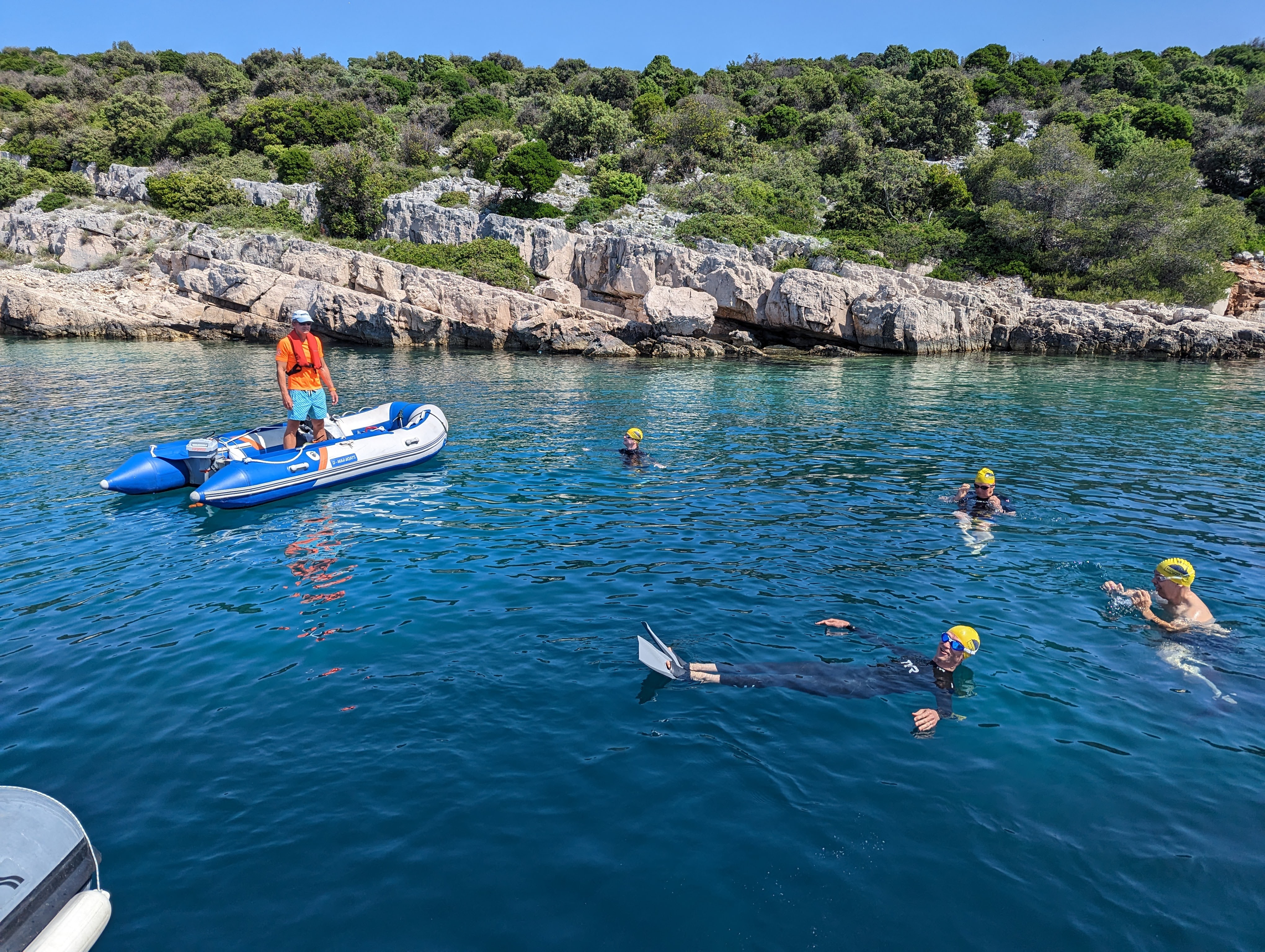
Initiative 4 | Electric Engine Alternative
While in the background we are making steps to start auditing and assessing our various environmental impacts, there are certain steps we can take to try and reduce and improve our impact immediately...
We know that actions we take and elements of our operations already produce negative impacts. Without waiting for our audits and assessments we can start making some changes now.
Control what you can control
On the majority of our locations and trips we rent boats and other equipment from local suppliers. However, on a few trips we still own SwimTrek-operated small rigid inflatable boats (RIB’s). These serve as a safety requirement when supporting our swimmers. Though at the same time (whether we're using highly polluting 2 stroke engines, or the only partially better 4 stroke alternatives, they have the additional negative effect of polluting water with chemical runoffs, climate with the addition of carbon gases, air quality from hazardous fumes and noise pollution from loud fossil-fuel-burning engines. Any swimmer downwind of a 2 stroke engine for any length of time knows exactly what we mean.
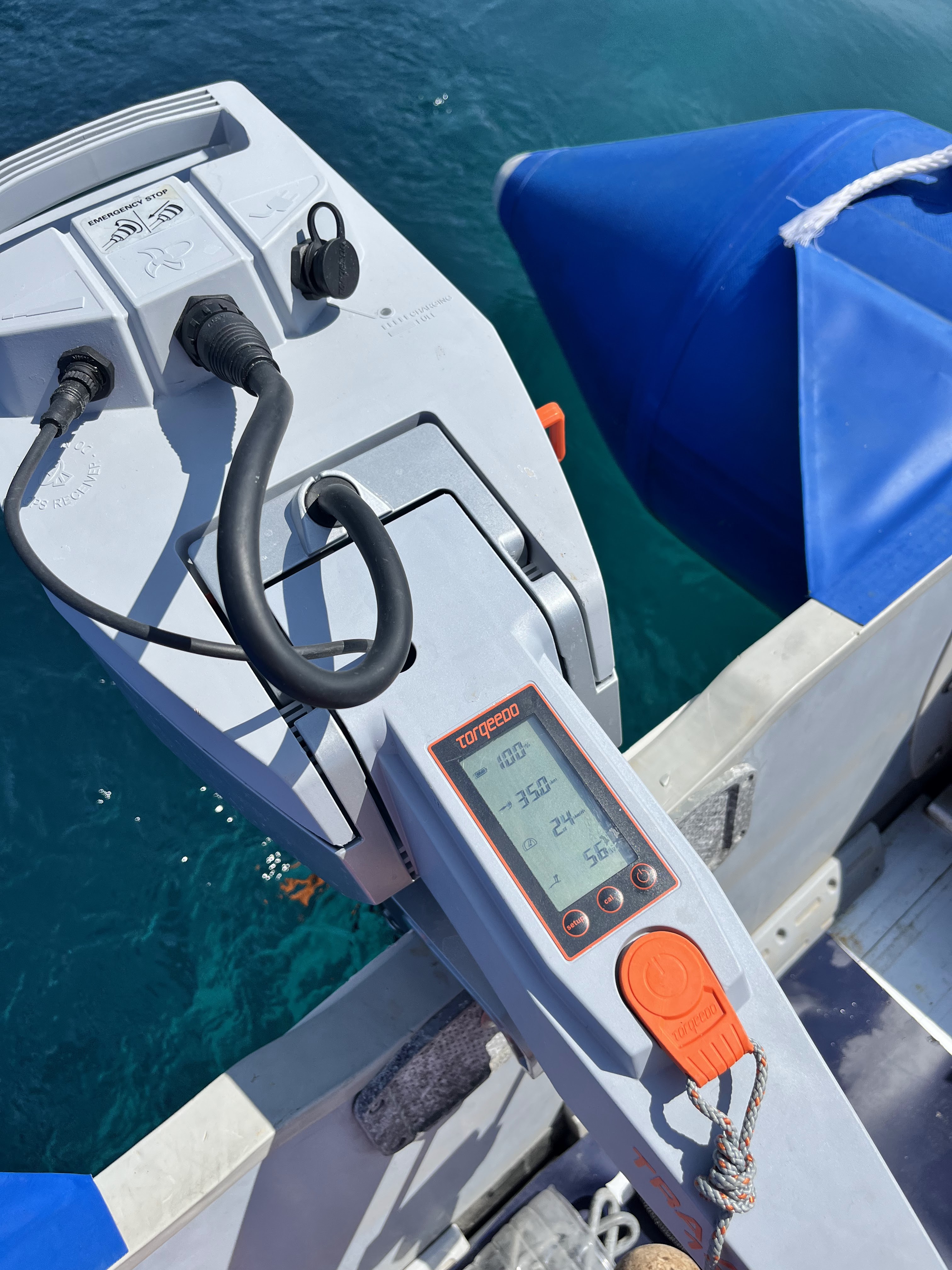
The issue
While the carbon produced from these watercraft pales in comparison to that generated from customer journeys, management of these small RIB’s and their emissions is within our immediate control. Our calculations presume a small RIB operating in Croatia over a 21-week working season contributes approximately 1680kg of CO2e to the environment annually.
| Average marine engine usage | Fuel Consumption (litres per hour) | Average emission factor of CO2e per litre |
|---|---|---|
| 4hrs / day X 5 days x 21 weeks | 5.5 (WOT- max CO2e) | 2.31kg |
| Kg CO2e per week | Total hrs. / year | CO2e saving in 2023 |
|---|---|---|
| 254.1 | 420 | 1,680kg |
Fuel consumption calculations are averaged and based on data from outboard motoring consumption tables.
CO2e emissions calculations are averaged and based on data from gov emissions calculations.
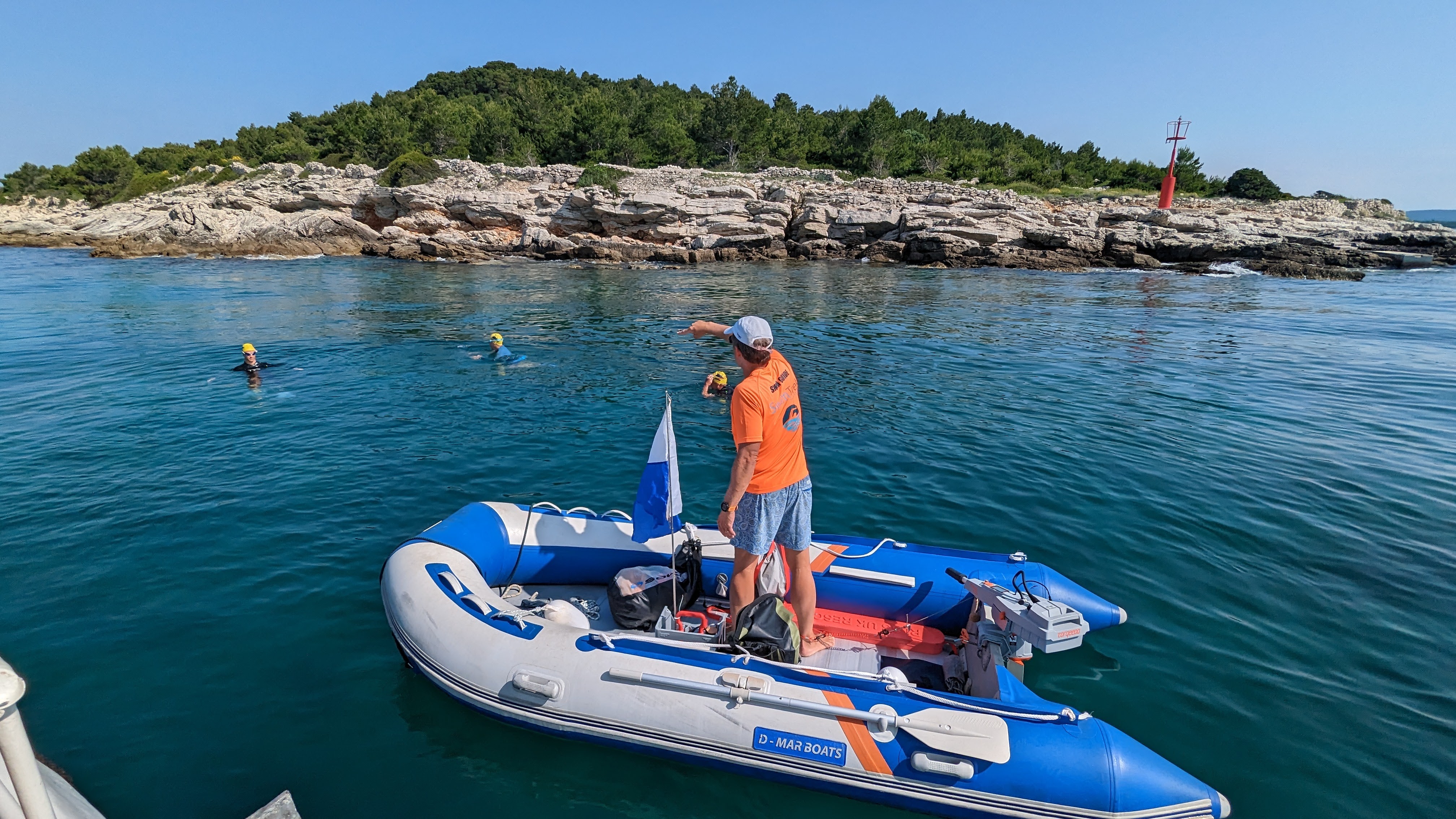
Removing that amount of CO2e in 2023
In 2023 we have retired one of our marine outboards and have replaced it with a new electric replacement built by Torqueedo. This is our first test of a small electric engine’s ability in the field, enabling us to make an early step towards reducing our negative impacts directly in the environments in which we operate.
In Croatia, we received delivery of our first unit and are using it as we speak. We operated with the engine on our marathon and LDT training camps and it is now in use on our classic Dalmatian coast swimming holidays. So far, the trial has been a success!
A long passage
We currently operate in over 50 separate locations in more than 20 different countries. We are all too aware that replacing 1 engine in one location is not going to make the change we need, but it is a trial and a start. Taking lessons learnt from this, we hope to scale and expand our approach to swimming safely using different tools, different engines and different approaches.

Initiative 5 | The ‘S’ In ESG
The next of our 20 Initiatives focuses on a lasting social pledge to build communities instead of customers. Now, we want to champion the benefits of open water swimming for mental health and communities.
We have just finished our first six-week Introduction To Open Water For Mental Health And Wellbeing programme. The course was fully funded by SwimTrek, but we did ask for a voluntary donation towards our chosen charity of Sea Trees, which supports communities and scientists who protect and regenerate blue carbon coastal ecosystems.
Who Took Part In The Course?
The six-week course was developed to offer individuals within the emergency services an opportunity to engage in one of the fastest growing (and possibly most rewarding) activities in the UK, with a view to improve their short-term mental health, as well as building a community of local open water users for longer term health benefits.
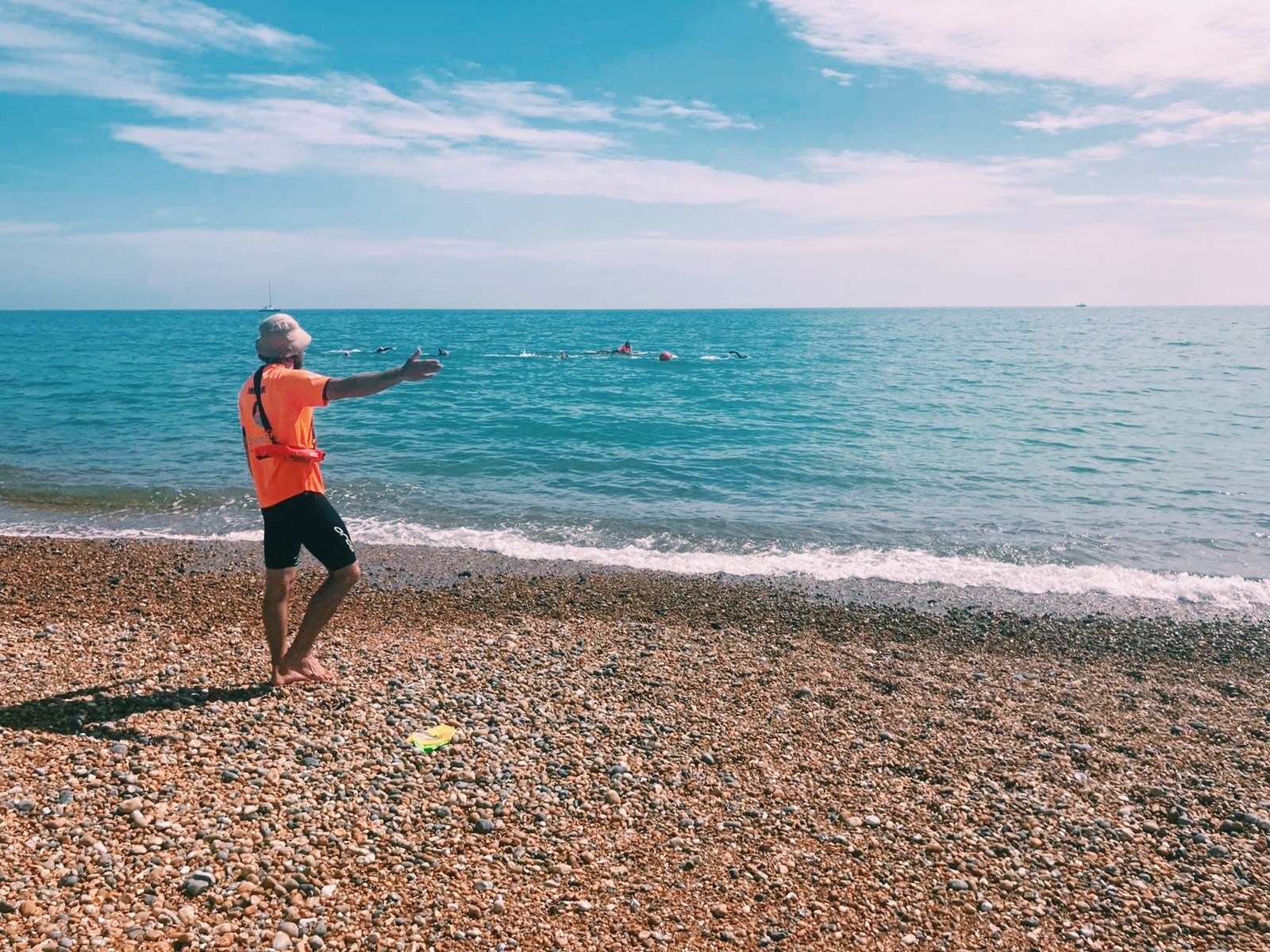
Why The Emergency Services?
The program was offered to Sussex and Surrey Police, Sussex Community Foundation trust, Sussex NHS and West Sussex Fire and Rescue. We had over 20 individuals expressing an interest in just a few days, with a pilot programme capacity of only 15.
As the daughter of two Police Officers and a previous colleague to others, I have experienced first-hand the impact an emergency service role can have, not only on the individual, but also their family and friends. The emergency services are often incredibly stretched and under resourced, with the daily demands of the role far exceeding the support that providers are given. Regular exposure to traumatic and stressful events takes its toll on mental and physical health. Evidence supporting the health benefits of open water use is ever-growing and we wanted to harness it and share it.
Why Open Water Swimming?
Essentially, group open water swimming consists of three components that are key to improving or maintaining a healthy mind.
Expose to the outside, the elements (sun, wind rain) and to cooler water.
The challenge of learning a new skill or pushing a person’s ‘comfort zone’, breaking boundaries and exploring new possibilities.
Being part of a group of others experiencing the same thing, asking for help or supporting others to achieve goals.
A combination of these three factors provides the best opportunity for long term engagement and can assist in sustaining or improving the mental health of an individual. An improvement in mental health and development of coping strategies can support an emergency worker to continue in a profession they are good at, very much needed in and ultimately enjoy.

The Programme
We started every session with a ‘primal scream’ - a chance to let it all out by screaming into the water, with no questions or judgement. We then started working on body position, breathing and confidence in the water during our pool sessions. We soon progressed into the open water where we took a moment to appreciate our environment, learn about the local currents and tides and how to read the waves.
The Impact
Over the six weeks, we saw a significant change in peoples' attitudes to the water, their confidence and even their trust in their abilities. As a group, we shared tears, screams, laughter and smiles. While it was just a short, 1 hour session, once a week for 6 weeks, the group bonded over their achievements, made huge progress and have discussed a regular Wednesday evening swim session. We finished the 6 weeks with a 1km swim from Brighton Pier to Sea Lanes - a swim they never thought they would be able to achieve!
“Really enjoyed the course. Not something I thought I would ever partake in but thoroughly enjoyed it... Lucia and Nikki are both excellent coaches, great energy and really engaging."
Supporting everyone’s mental health is critical within society, in all sectors and demographics and we hope we can grow this programme to continue to offer support to all.
“Joining this course has allowed me to meet new people, be in new environments, improve my activity levels as I am swimming nearly everyday outside of the course, give me a new hobby and focus - which has all improved my mental health!"
As part of our commitment to working with the local communities that we visit, we thought we would start with our own local community here at our HQ in Brighton. The 'S'ocial in 'ESG' refers to how a company treats different groups of people. In this pilot programme, we wanted to use our knowledge and skills to support our local emergency services.
“The entire course was so much fun and I always felt better afterwards, even if I was having a bad day. The instructors are very kind and supportive, and I can already foresee me becoming one of the crazy people who going in the sea on Christmas day!”
Authored by Nikki Gatland - Product Executive
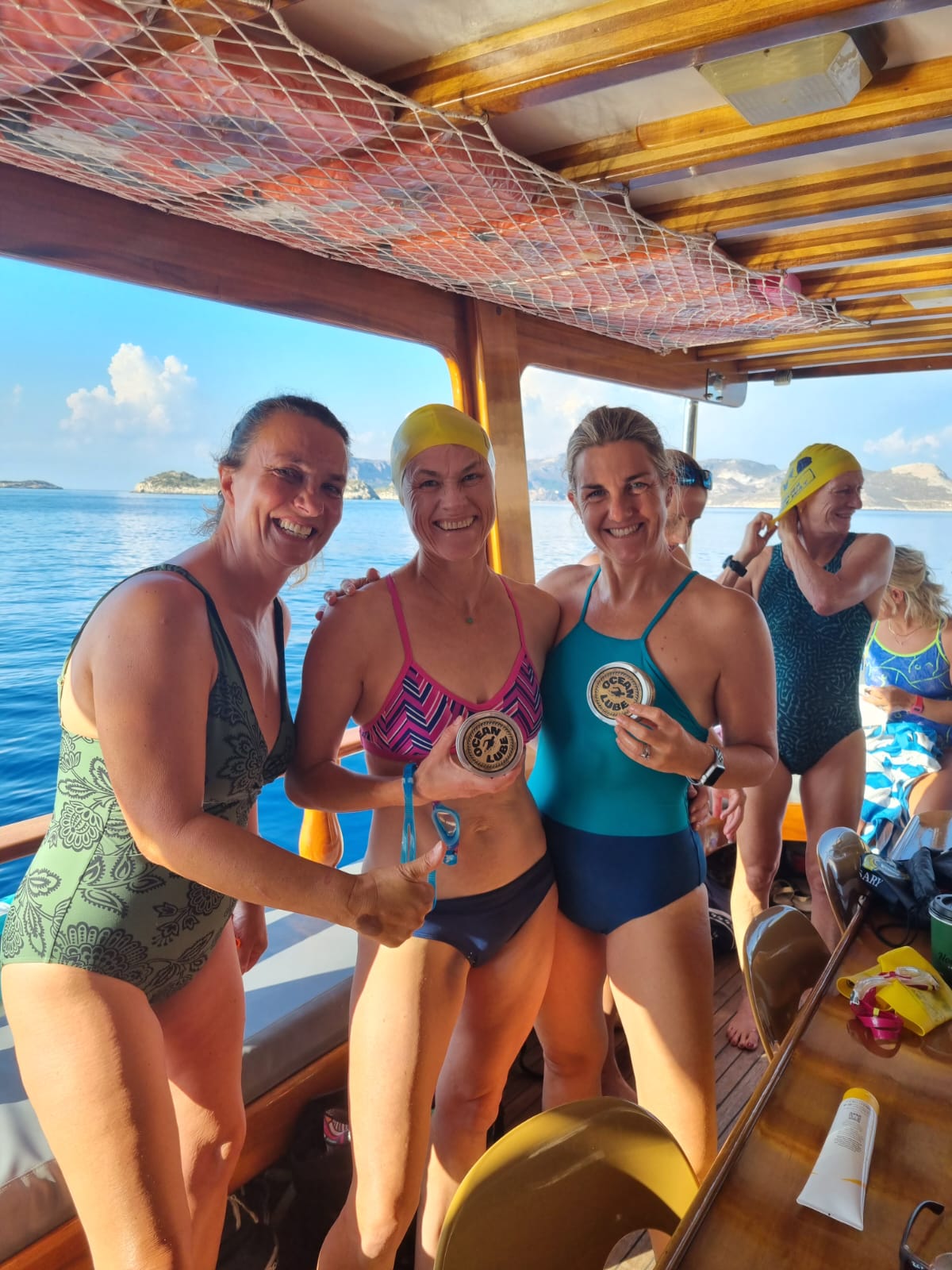
Initiative 6 | Sustainable Products
For Initiative 6 of our 20 Initiatives we've been looking at areas of the business to pinpoint where we can improve. In this addition, we are looking at one of our environmental factors, which is the use of petroleum based anti-chafe products...
Why We Use Vaseline
What do you pack when you head out for a SwimTrek - or, any open water swim for that matter? Some of us pack light: suit, goggles, cap and done. Others like to have their wetsuits, tow floats, google spray, dry bag. Many of us who head out for longer swims, especially in salt water, will also grab a pot of Vaseline. Unbeknownst to the novice this little tub of goop can save a swimmer from painful chafing, which can irritate for days to come. So, a top tip before getting in is to lube up! Sadly though, it is not as simple as all that.
Why We Shouldn’t
As with so many things these days however, it is no longer as simple as just popping to the local shop and grabbing a pot for a few quid. Yes, Vaseline works, but at what cost? Vaseline is made from petroleum jelly, a by-product of the oil refining process. Its production alone consumes fossil fuels, releases greenhouse gases and causes air pollution. It is not sustainable, not environmentally friendly and it damages the seas, oceans and rivers that we love to swim in.
Petroleum jelly is a polycyclic aromatic hydrocarbon (PAH) negatively impact marine wildlife from fish to the organisms living on the sea floor (Treehugger.com). On top of this it also can be a real pain to get off your skin, often transferring to towels and sheets. This can lead to more laundry and more frequent replacement of these items creating another environmental impact.
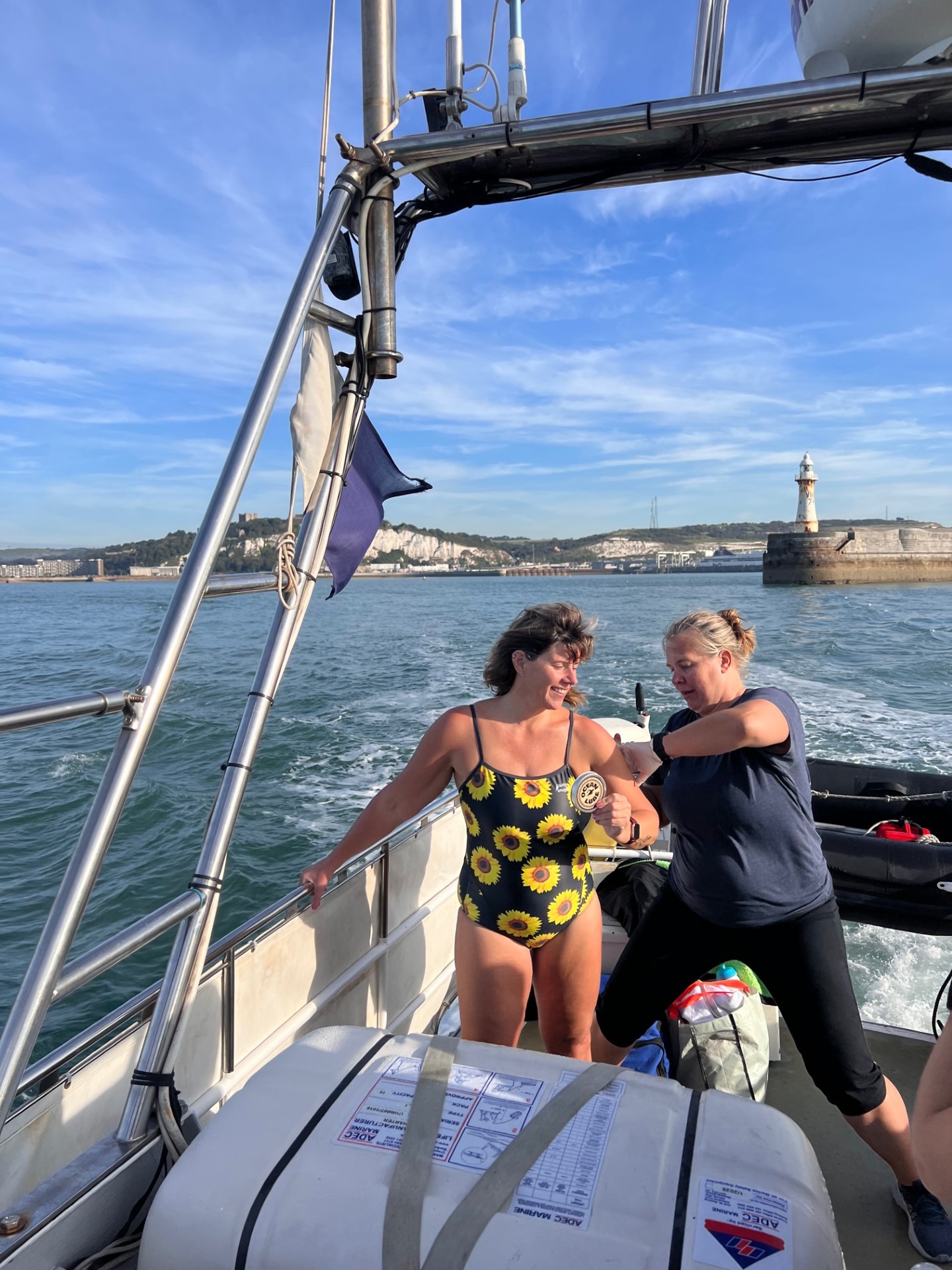
Why We Are Swapping
As part of our efforts to reach B Corp status and do better by the planet we are making many changes to how we operate. Some of these are large, others small but they all add up. Making a step in the right direction, we will no longer be using or recommending to our guests to use any petroleum-based products to avoid chafing.
The first and simplest step is reducing consumption, that means us and our guests only using products when we really need to - we'll use them sparingly or not at all if we don’t really need to! The more complicated part to this is finding an alternative to well-known products, but don’t worry, we have done the hard work for you and found an answer... Ocean Lube.
'As part of our efforts to reach B Corp status and do better by the planet we are making many changes to how we operate. Some of these are large, others small but they all add up...'
Why We Like Ocean Lube
Firstly, it works! Having tried out a few eco-friendly anti-chafing creams over the summer we found that Ocean Lube was our swimmers' favourite. Our guides took it out to the Greek Cyclades in September and our HQ team used it for their Channel Relay swim and the feedback from both camps has been top notch.
Everyone that tried it was a convert, vowing never to return to the dark side again! Not only did it serve it’s purpose – no chafing – it was also a breeze to wash off and didn’t damage or stain any sheets.
As a product, it is sensitive to temperature so bear this in mind when applying, heat makes for a runnier consistency and cold means it's harder to get out the tub, but no one found this to be much of an issue and it still did what it was designed to do!
This coming year will be our pioneer year with Ocean Lube, we will be working directly with this independent supplier to make a permanent change from petroleum-based products. Our aim is to completely eradicate the use, however we won’t necessarily be able to do this at every location right away. We will hit bumps in the road and can’t top up locally, so may need to revert on occasion but this is when we also reinforce our ‘reduce’ mentality. If we must use unsustainable products, we must use them as little as possible.
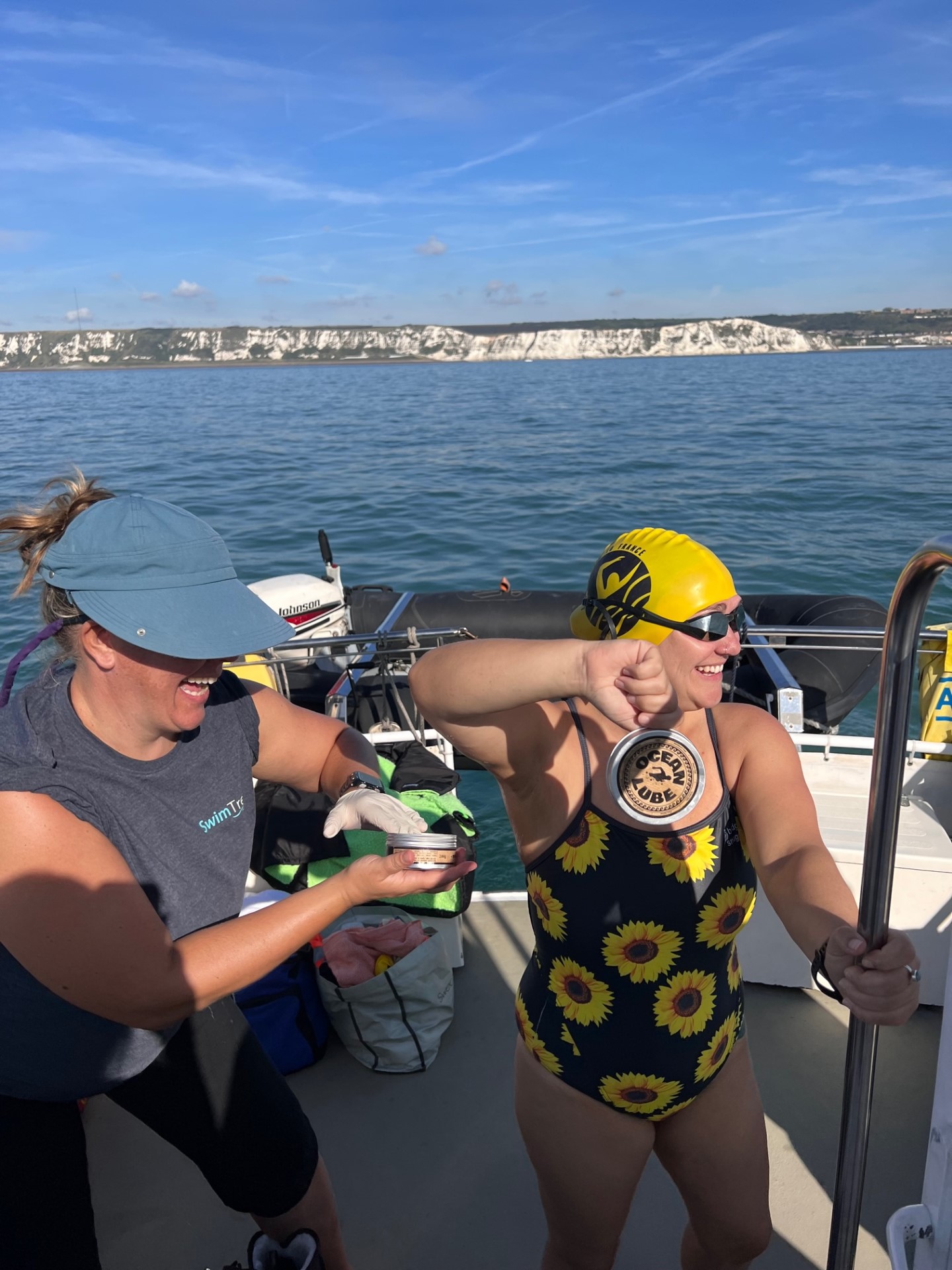
Ocean Lube are a small company, they make and package each tub by hand. They’re also fully plant-based, plastic and cruelty free. It is made from a blend of shea butter, coconut oil and aloe vera gel - all natural, all great for your skin and all totally harmless to the oceans! Add to that the fact it doesn’t react with neoprene or rubber, meaning it also protects your wetsuit if you wear one.
It’s so great that we at SwimTrek are venturing into a partnership with Ocean Lube in the hopes of providing this amazing product to our guests. In the meantime, we highly recommend that you buy a little pot for yourself and start using it! Any time you would have reached for that familiar plastic pot, stop and grab this cute little tin instead.
So there you have it, one more step down the path to a more sustainable SwimTrek! You can help us too by trying to make similar changes when you swim without us. Of course, this is just one small change, we will be looking at all areas of SwimTrek and how we can improve on the environmental factors as well as social and governance.
Authored by Naomi Swailes - Operations Coordinator
Initiative 7 | Sustainable Innovation
During 2023, we researched and reached out for opportunities that could support our sustainability journey. We soon came across the LOCASE - a low carbon initiative that supports businesses to improve their services through innovative and sustainable industry solutions.
The LOCASE programme was a part UK Government and part European Union funding agreement managed through European Structural and Investment funds, which were aimed at supporting businesses to develop new and innovative projects that can abate carbon impacts. Through rounds of applications SwimTrek was successful in gaining the full LOCASE grant to stimulate the purchase of a new innovative combination of tech, which could provide swim support and safety provision in an open water swimming environment.
The Idea
SwimTrek partnered with RED Rescue to add an additional fin mount to their inflatable rescue stand up paddle boards and prone boards. We then proposed the addition of a portable Scuba jet pro unit to supplement the SUP board creating 1 unit that could support our long-distance swimmers in a close quarters rescue environment. These combined units can then be taken to our global swimming locations to support the equipment already stationed there. The aim is to reduce a number of concerns, such as spinning propellor's, petrol fumes and pollution, noise reduction and allowing guides to provide closer support.
Challenges And Solutions
As with any innovation there have been complications. The nature of many of our locations is such that sea states may dictate more powerful craft are needed to support our swims. In response to this, we are sending these SUP and electric motor units to locations as an addition to our guides safety equipment. In this way, the guides can choose on any given day or swim what safety craft should be used to best support the swims.
In our trials in 2023 on our Milos and Greek Cyclades trip we found our guides chose to use these units in replacement of the petrol engine safety boats 2-4 times a week (depending on the conditions of each swim).
As a result, we have provided the guides the decision making and tools on the ground to remove (where possible and suitable) the use of petrol boats on these trips. In this way we were able to reduce the use of 1 of our petrol RIBs on 20-40% of the trip. Again, small changes such as this innovative and adaptive solution to swim support won’t do everything - it won’t make the global change we need, but it’s doing something, and we’re committed to doing more.
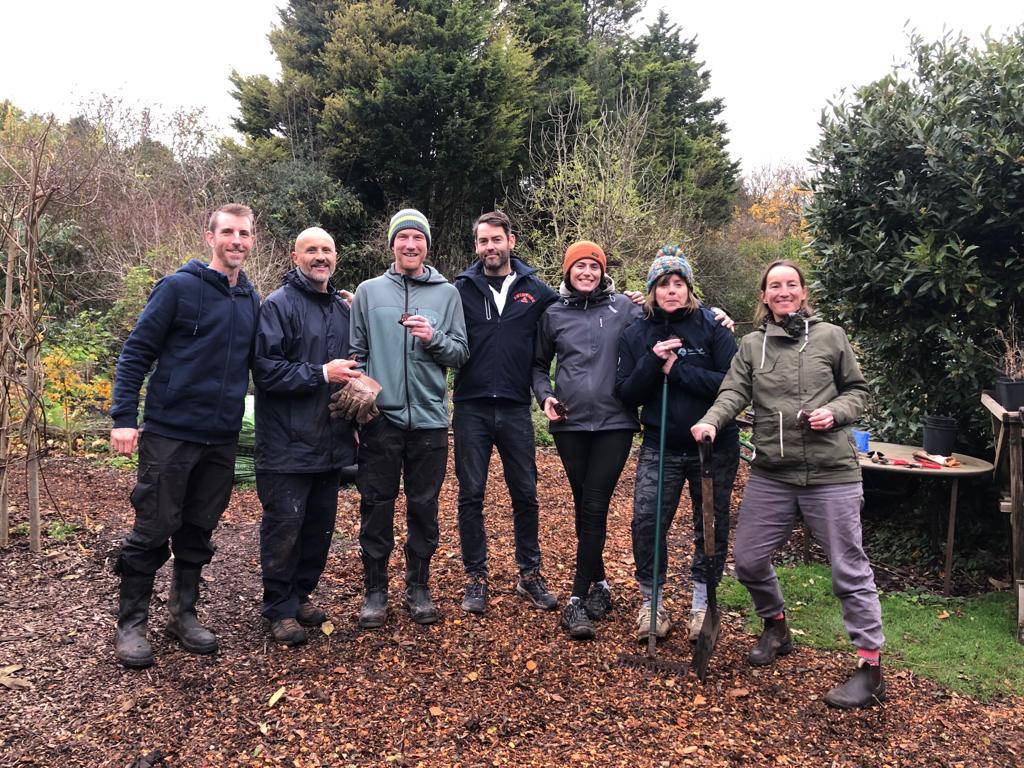
Initiative 8 | Living Vital – SwimTrek Partnerships
SwimTrek Volunteer Days
In late 2023, some of our HQ team spent their first day volunteering ‘on the job’. We’ve talked before about B Corp and the ESG initiatives that will help us gain this certification but more importantly will make us a more sustainable and inclusive company. These initiatives reach beyond the business itself, not just focusing on what we do day-to-day as a company, but also how we can support and have a positive impact on our local community.
As part of this process, SwimTrek HQ staff are now entitled to and encouraged to spend one day a year volunteering at a project of our choosing, within our work hours. This scheme allows us to give something back to our local community. For many of us here, sustainability and the environment are a high priority, so when we were introduced to Living Vital we felt we’d found a great match.
'As part of this process, SwimTrek HQ staff are now entitled to and encouraged to spend one day a year volunteering at a project of our choosing, within our work hours.'
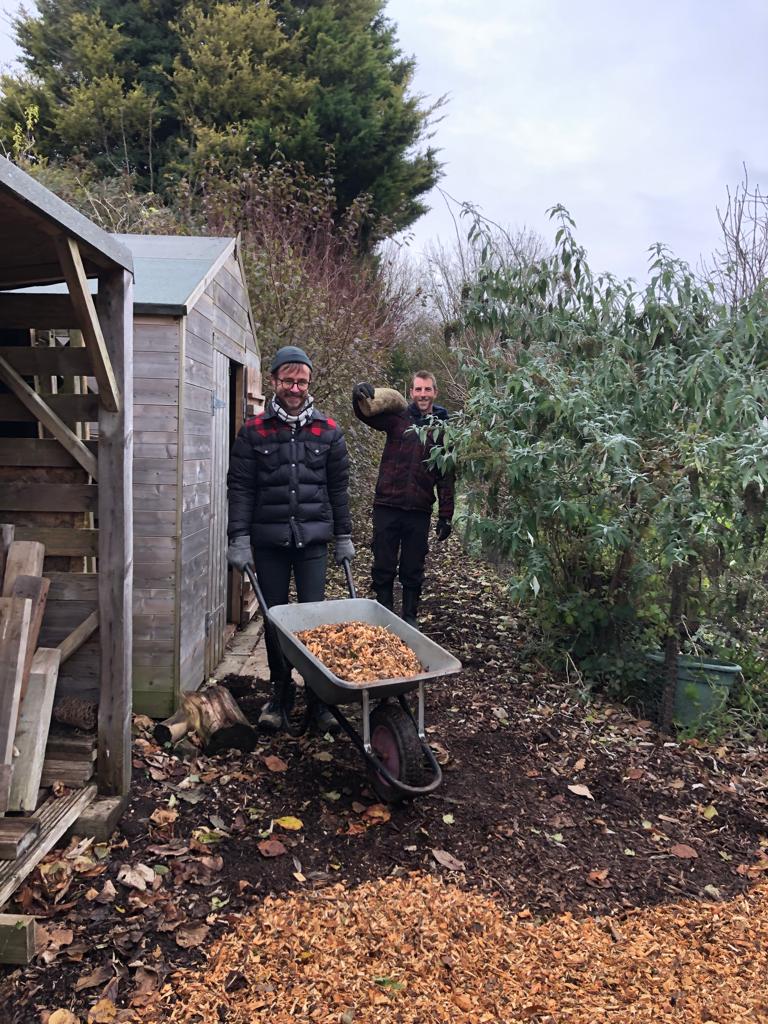
Living Vital: Who Are They? What Do They Do?
Living Vital are a local charity based at Stanmer Park just outside of our head office base in Brighton. They have a space among other charities and some businesses where they grow organic food and are in the process of cultivating a food forest based around the principles of Permaculture (permanent agriculture) whereby you create a garden around the existing local environment, growing seasonally and pesticide free. Their ethos around sustainable food production, permaculture, seasonal growing and healthy eating are also vital to the planet’s future.
More than this though they are offering a community space for people to meet, grow, learn and eat together. They work in partnership with refugee and migrant communities in Sussex. Linking with Voices in Exile, a charitable organisation, who facilitate and translate for these sessions.
Their mission is to ‘create spaces that allow for the sharing of skills, knowledge and ideas, along with the experience of connection, purpose and integration with all beings.’ They bring together people from all walks of life to grow organic food, build community and get to know each other. This project, Common Ground, provides a vital link for refugee and migrant communities, presenting an opportunity to meet people, either from similar circumstances or those local to the area, to connect with others and with nature as well. Plus, the bonus of growing, cooking and sharing food together!
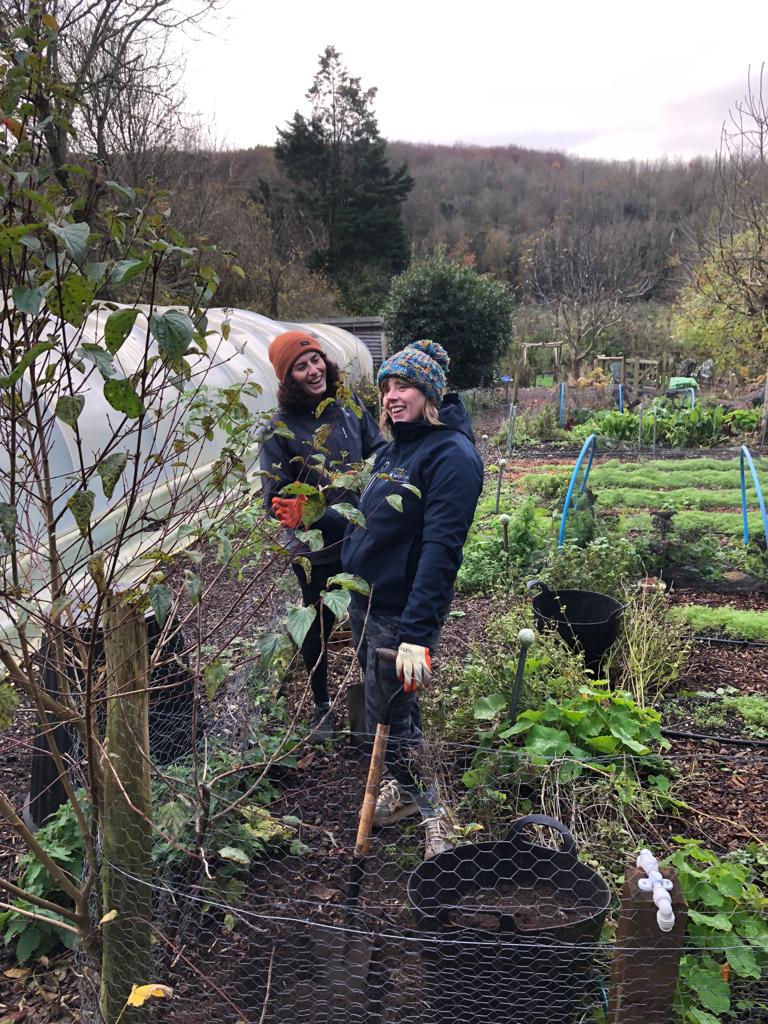
Why We Like Them
Living Vital were suggested to us by our head of Operations and Sustainability as a possible place that we might like to spend our volunteer time. Their project is not just in line with our sustainability initiatives but also social, on learning about their work there were many of us keen to go along and lend a hand.
What We Did
On arrival we met Nick and Alex, founders of Living Vital and, along with a cuppa, they explained the different areas of the garden and some health and safety around the work we would be doing and the principles of permaculture. They also explained that while we were there we were to do as much or as little as we liked, the space, the garden is as much about reconnecting with nature and ourselves as the physical work that needs doing. That said, we were excited to be outdoors and away from desks, so we were all keen to get stuck in!
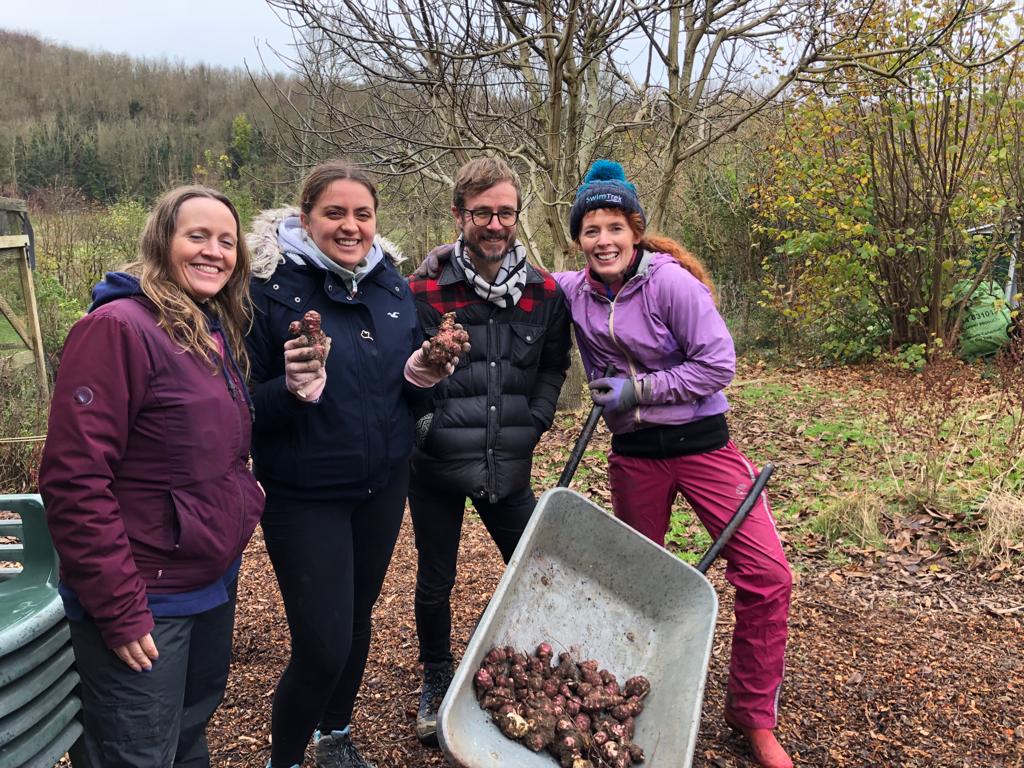
The Future
We currently operate in over 50 sites in more than 20 countries. Part of the positive impact that tourism can provide is becoming involved in these sorts of community inclusive projects not just here in the UK but on the variety of locations that we visit. Moving forward we will be looking for community partnership potentials that align with our goals and the principles of environmental stewardship that we’d like to encourage.
Authored by Naomi Swailes - Operations Coordinator
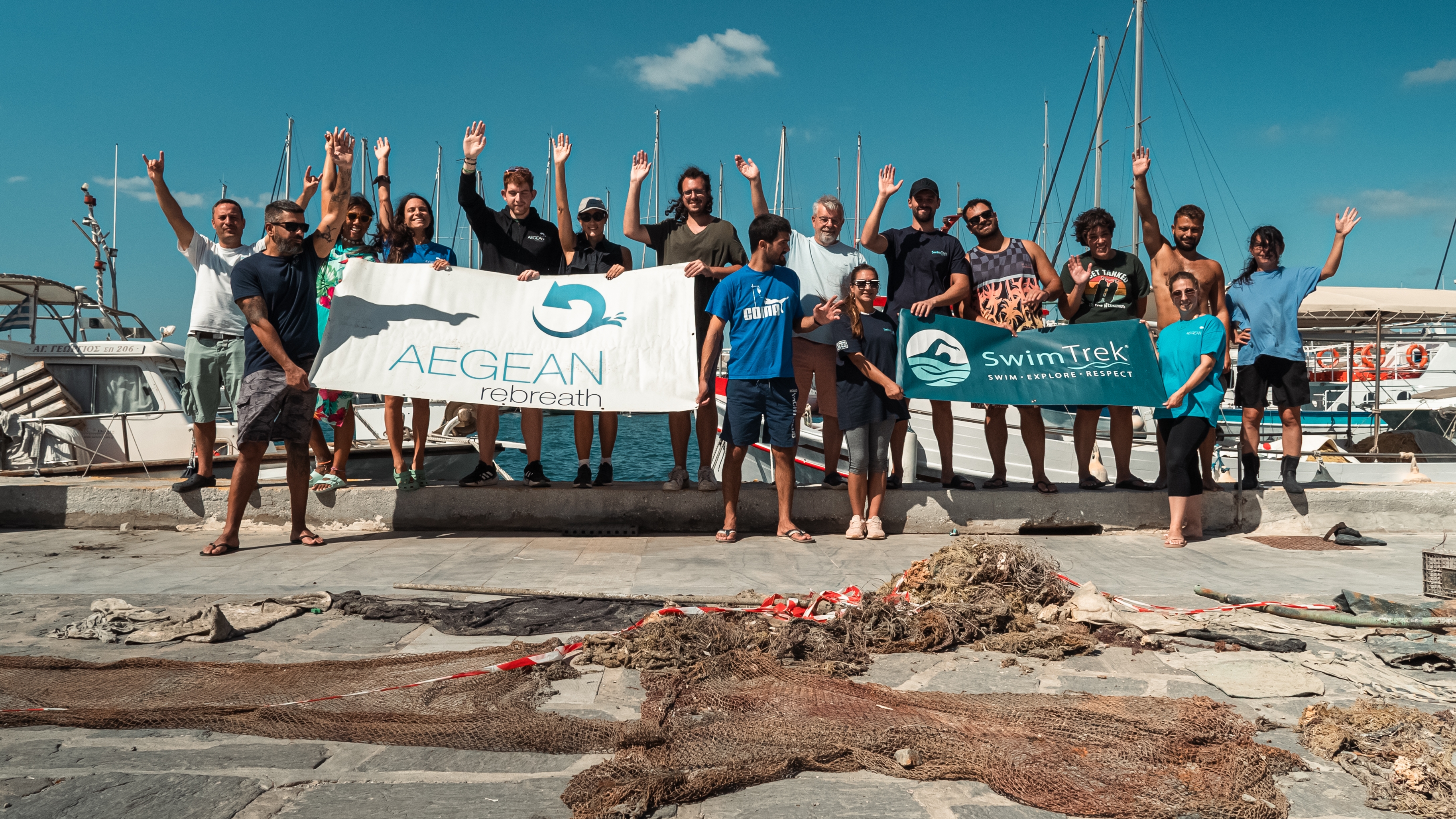
Initiative 9 | Aegean Rebreath – SwimTrek Partnerships
We’ve also started to work with a number of international charitable partnerships, supporting a range of social and environmental initiatives around the world.
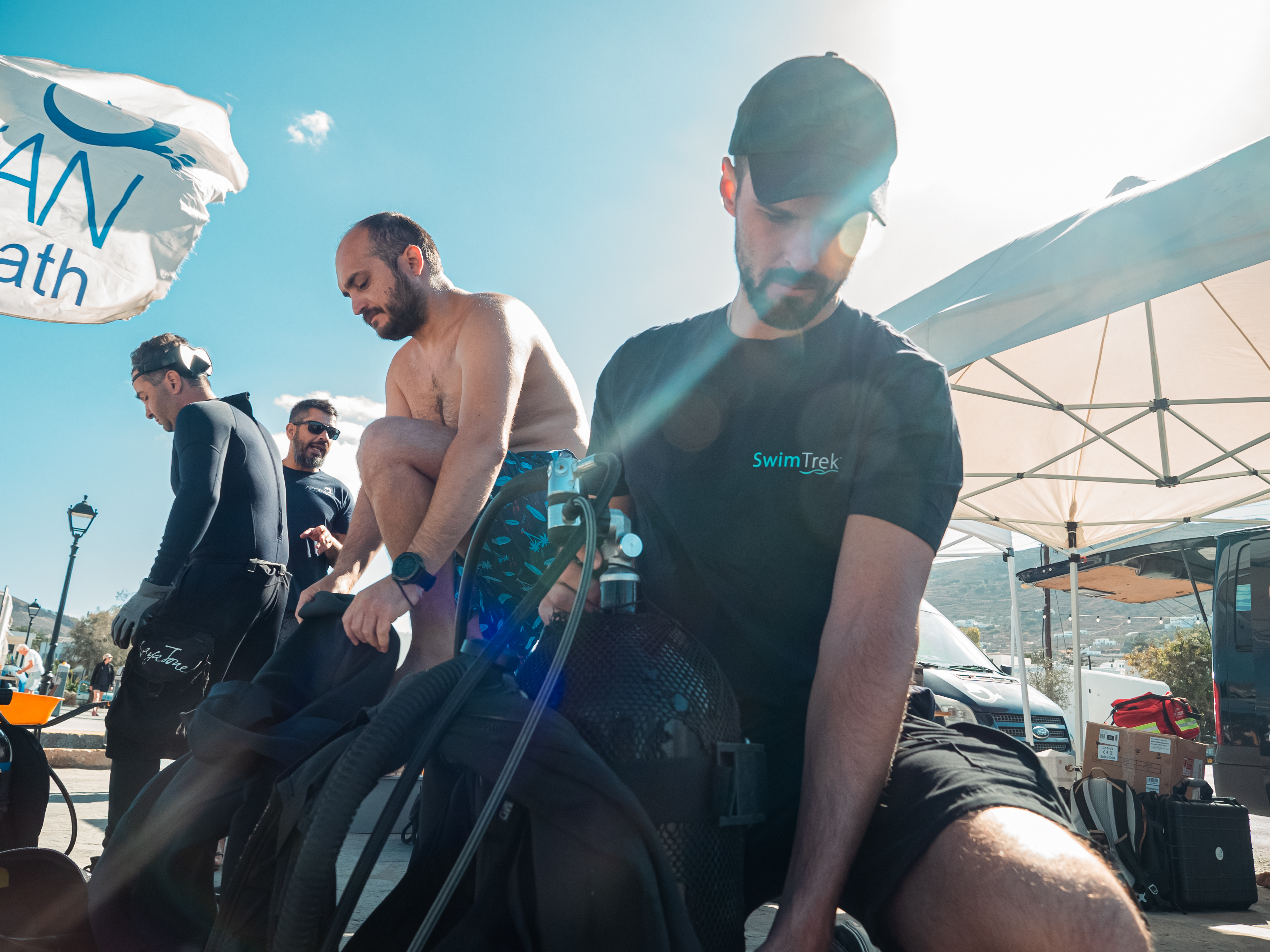
Our trips in the Aegean and across Greece represent a core part of our European summer programme. We reached out to Aegean Rebreath a Greek-based environmental organisation that organise targeted missions on different islands around Greece
‘tackling the problem of marine ecosystem pollution in an integrated and sustainable way’.
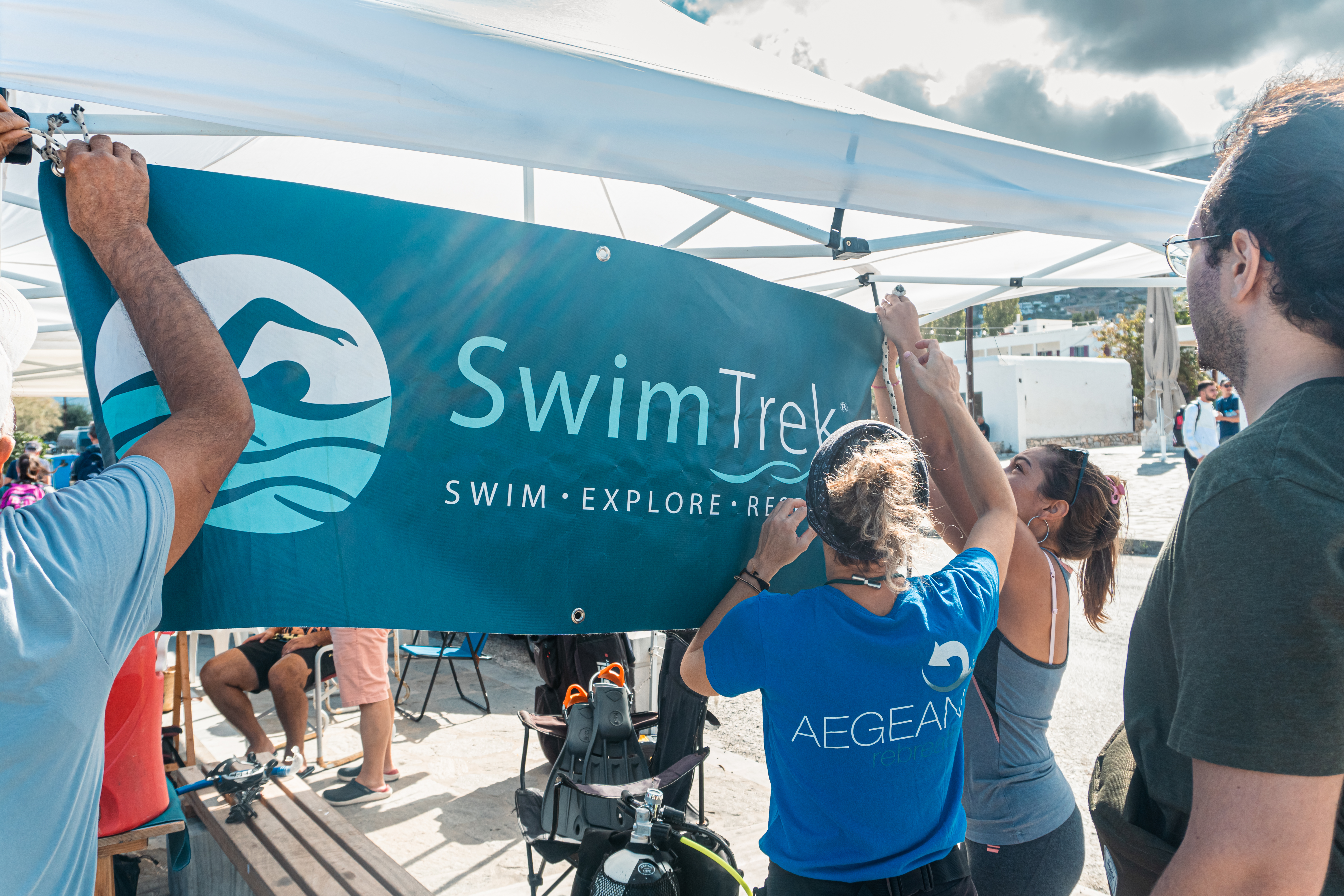
SwimTrek and Aegean Rebreath
Between 18th–20th September 2024 SwimTrek funded an Aegean Rebreath mission on the island of Paros.
Starting in Geniko Lykeio by running some engagement sessions with the local students. Aegean Rebreaths’ founder George starts these programmes by engaging with those who will be most affected by changes to our oceans.
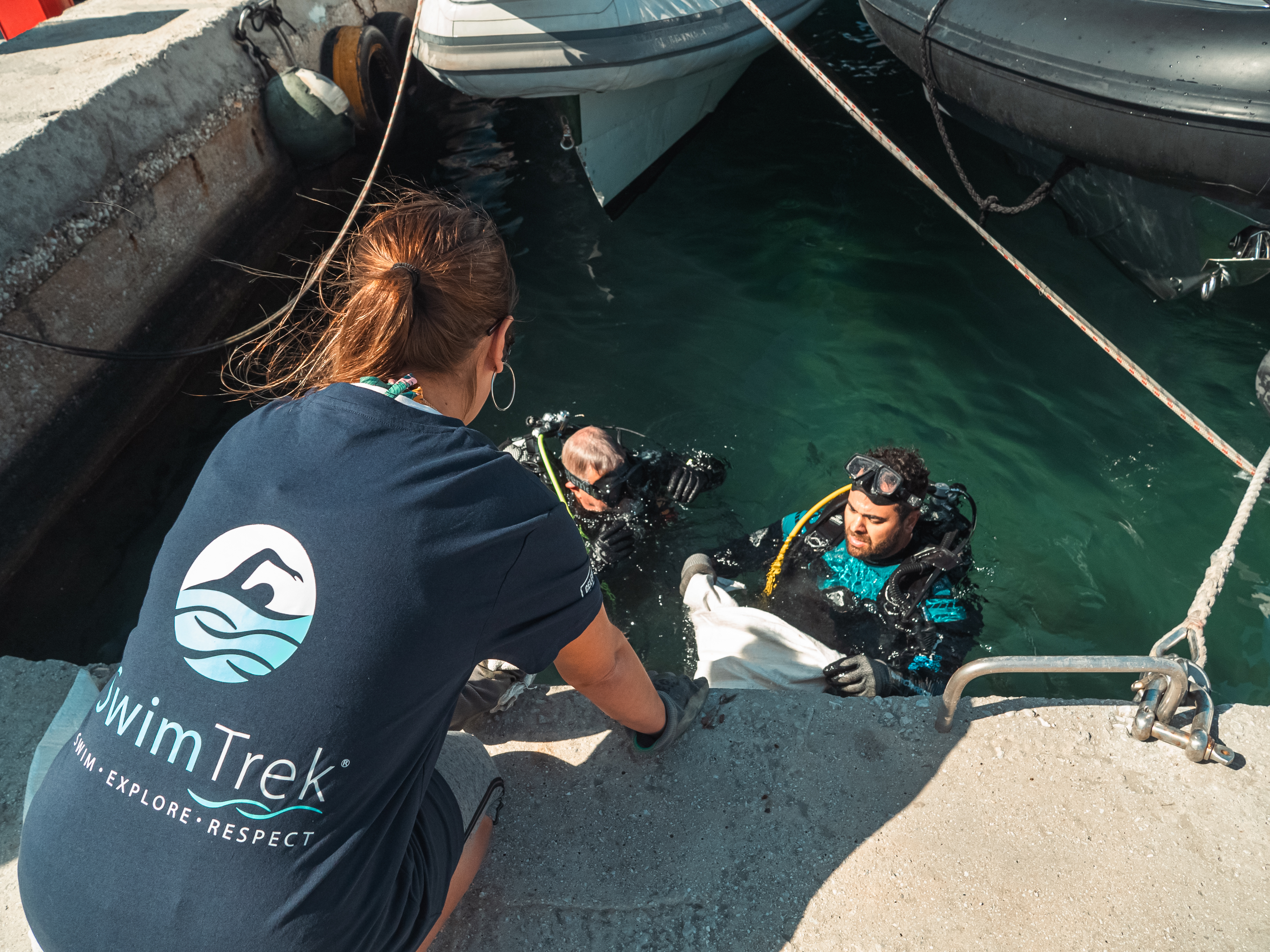
George works with stakeholders at all levels, so the next stop was to the Mayor’s office to lobby for further improvements on the island to encourage local leaders to engage and promote change.
A visit to the island recycling facility to review the first stage of on island recycling and promote areas for improvement here.
A ghost net dive got underway with personnel from Aegean Rebreath heading down to collect marine refuse from the sea floor, collecting 1000’s of items of waste directly from the ocean and taking it for appropriate recycling and disposal.
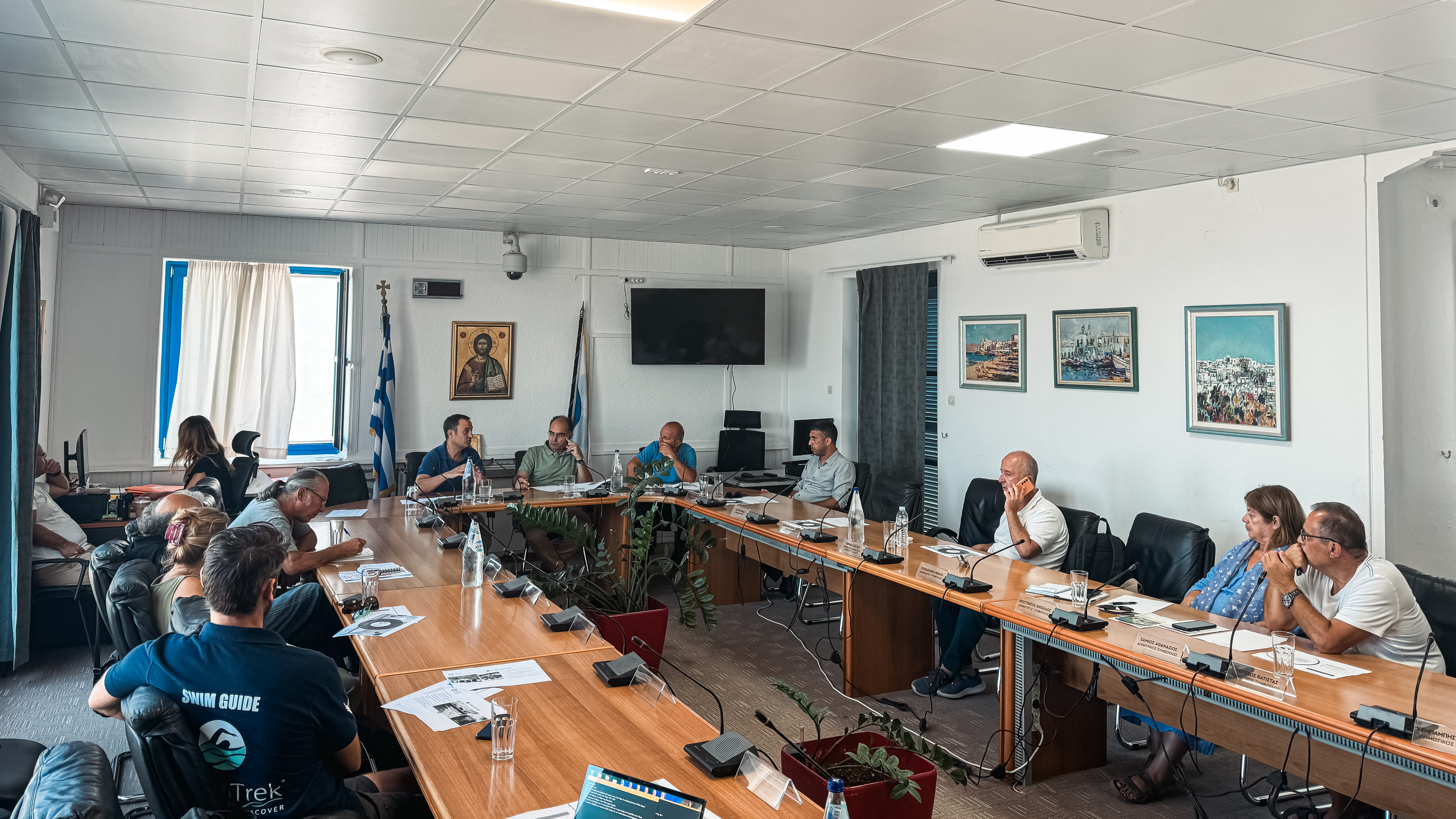
To facilitate lasting change, a new marine recycling station has now been incorporated into the island in the bay of Piso Livadia to allow passing boats to somewhere to appropriately dispose of their waste.
This first activity marks the start of an ongoing partnership promoting the activities of Aegean Rebreath through SwimTreks' ongoing commitment to improving our impact in the areas that we operate.
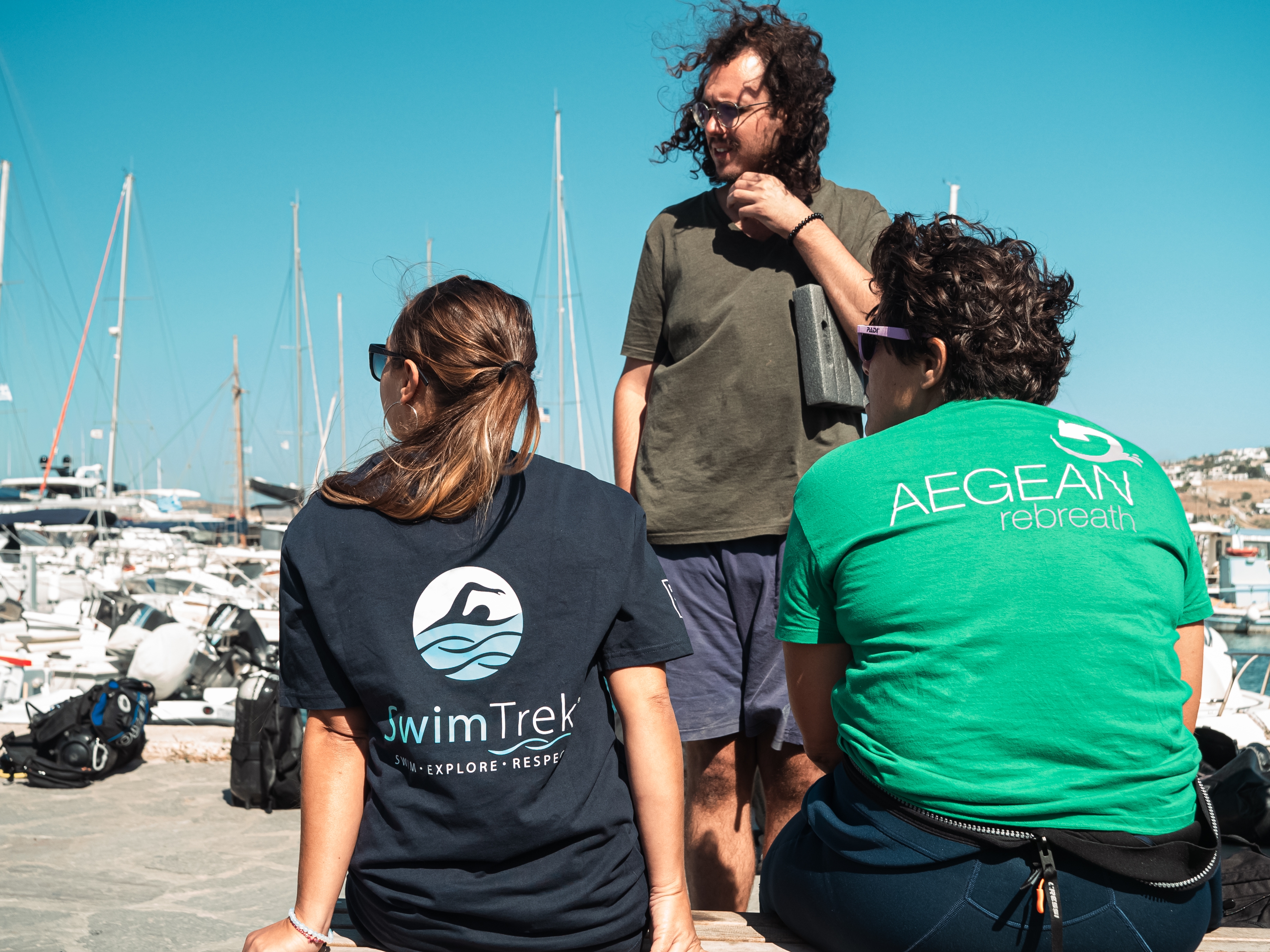
Authored by Reggie Lang - Head of Operations and Sustainability
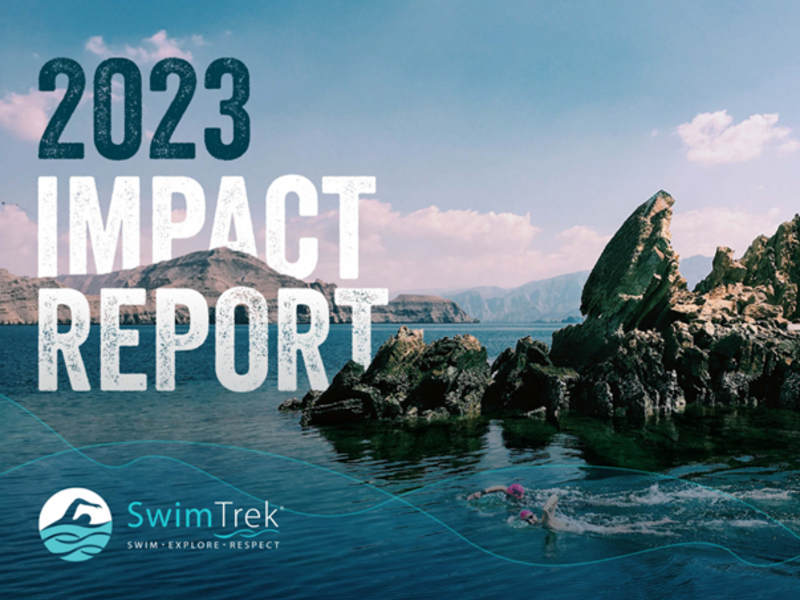
Initiative 10 | 2023 Impact Report
We’re delighted to publish our first Impact Report...
This represents the consolidation of a year's worth of initiatives that have been rolled out throughout 2023.
While it’s been great to be involved with so many partners and contribute to a number of initiatives, we would like to state that we’re aware this is just the start of an ongoing journey.
There is a lot more that we can and will do. Our hope is that this transparent reporting signals our continued commitment to improve what we do where we do it.
By setting ourselves targets across a variety of metrics relating to People, Planet and Profit, we aim to continue to measure and improve the impact of our business activities on both our stakeholders and the environment balancing our purpose.
This is our first impact report, but annually from here we will post updated reports to offer comprehensive analysis of our progress.
We’d like to take this opportunity to thank all those that have been involved in the various initiatives that have gotten us to this stage.
We’d also like to extend a warm welcome to our new and future partners - welcome to the family, come on in, the water is lovely!
A special thanks to our growing community of partners.
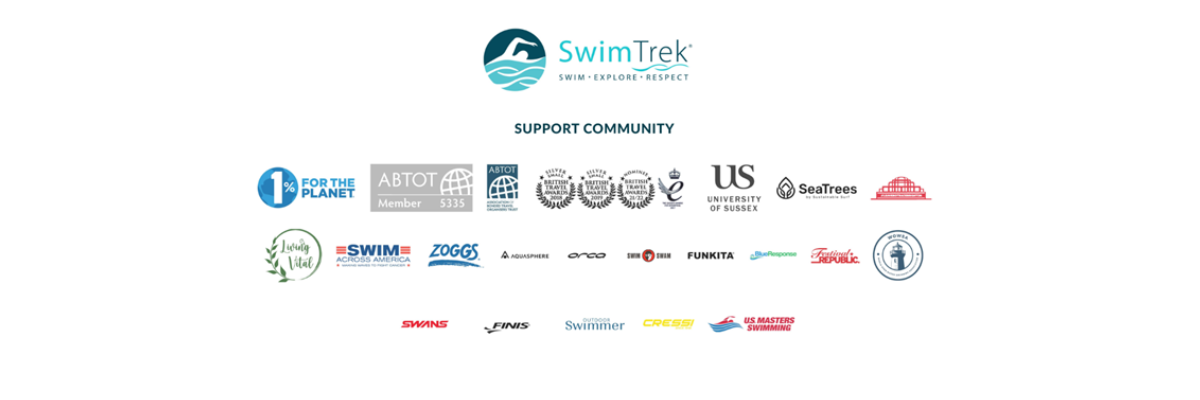
Initiative 11 | 2024 Health And Wellbeing Report
At the end of 2024, we compiled the findings from our Health and Wellbeing Impact Assessment...
As part of our journey on the road to B Corp certification we reviewed our year's outputs looking specifically at what benefits taking part in a SwimTrek had for our customers. This was the perfect opportunity for us to explore the physical and mental health benefits of swimming trips. Of course, we are all aware of stories that describe swimmers being uplifted by their sport and reciting improvements to the health of their minds and bodies.
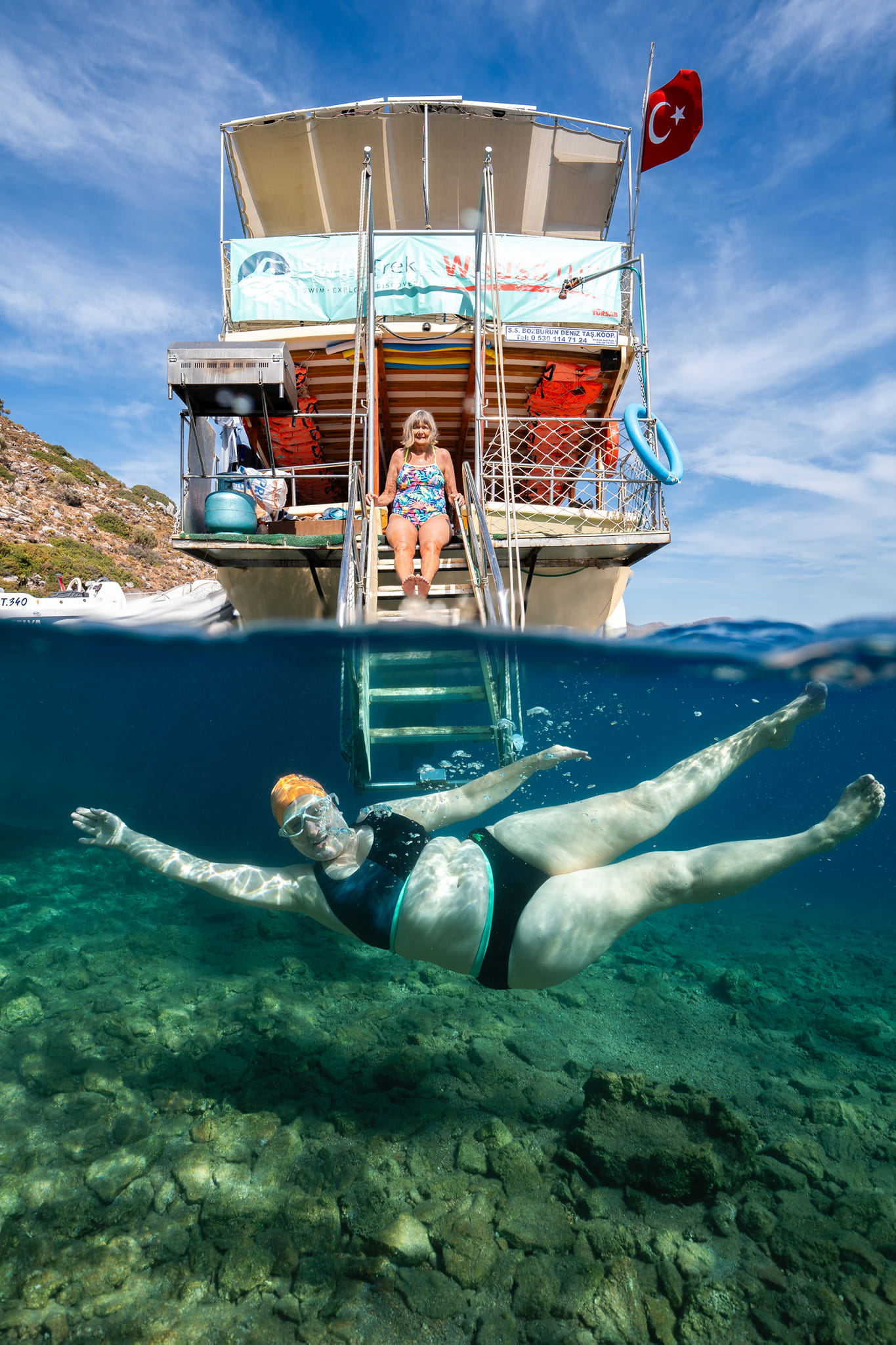
To dive into this supposition in more detail, we assessed a representative sample of SwimTrekkers (209 respondents) who went on swimming holidays during our busiest season. You can explore our blog on this report to learn more about the captured data and summarised responses they gave.
We were thrilled to discover the results from guests who took our survey were overwhelmingly positive:
- 111 said both their mental and physical health benefited (53.11%)
- 19 said only their physical health improved (9.09%)
- 28 said only their mental health improved (13.39%)
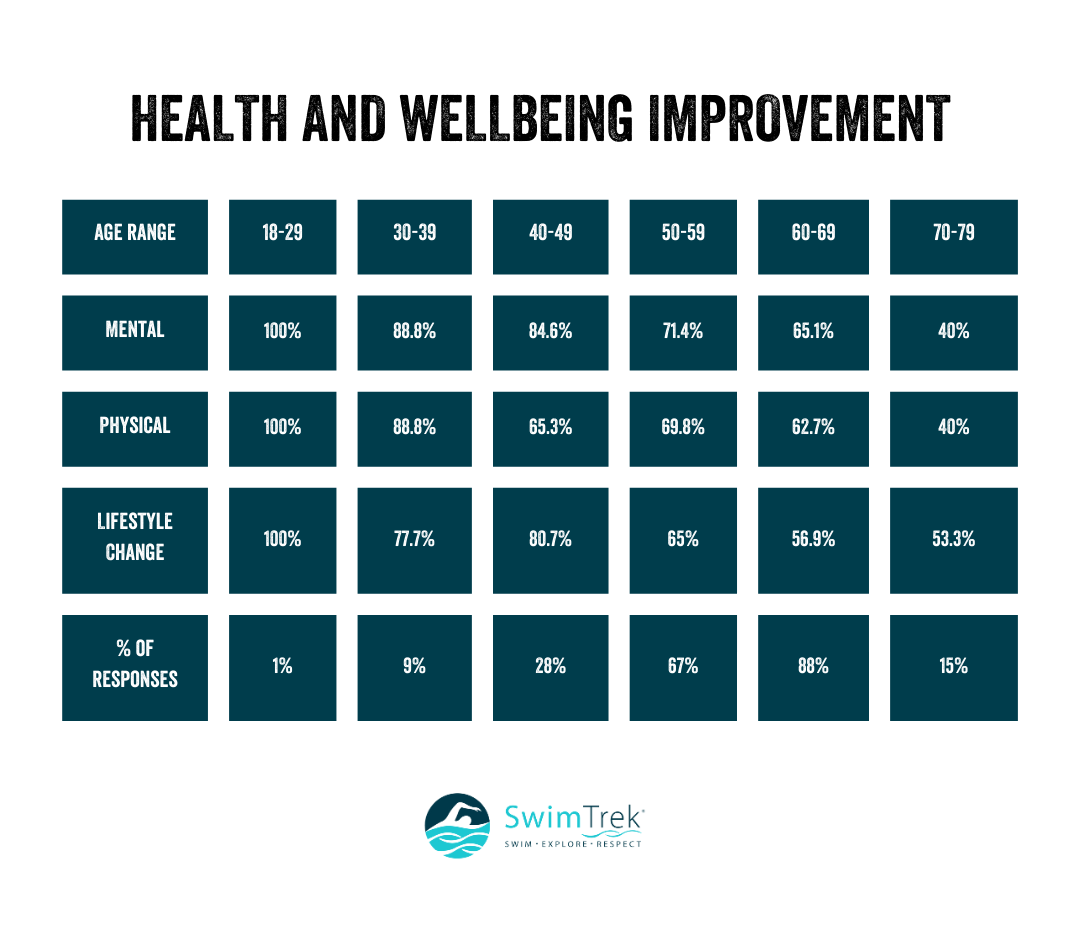
Overall, of those surveyed, 158 (75.59%) reported either a mental wellbeing, or physical health improvement as a result of their experience with us. As always, there is room for improvement, but this does serve to reinforce our long-held belief that active holidays have a significant positive impact on both mind and body.
SwimTrek are proud to continue to move down the Impact Business Model, meaning our trips contribute toward specific health and wellbeing improvements for our customers.
2024 HEALTH & WELLBEING REPORT>
In 2025, SwimTrek continues to offer a wide variety of experiences in stunning open water locations, away from daily life, which provide significant mental health benefits to the majority of participants, helping them feel more balanced and emotionally refreshed...
Initiative 12 | SwimTrek Beach And Location Clean-Ups
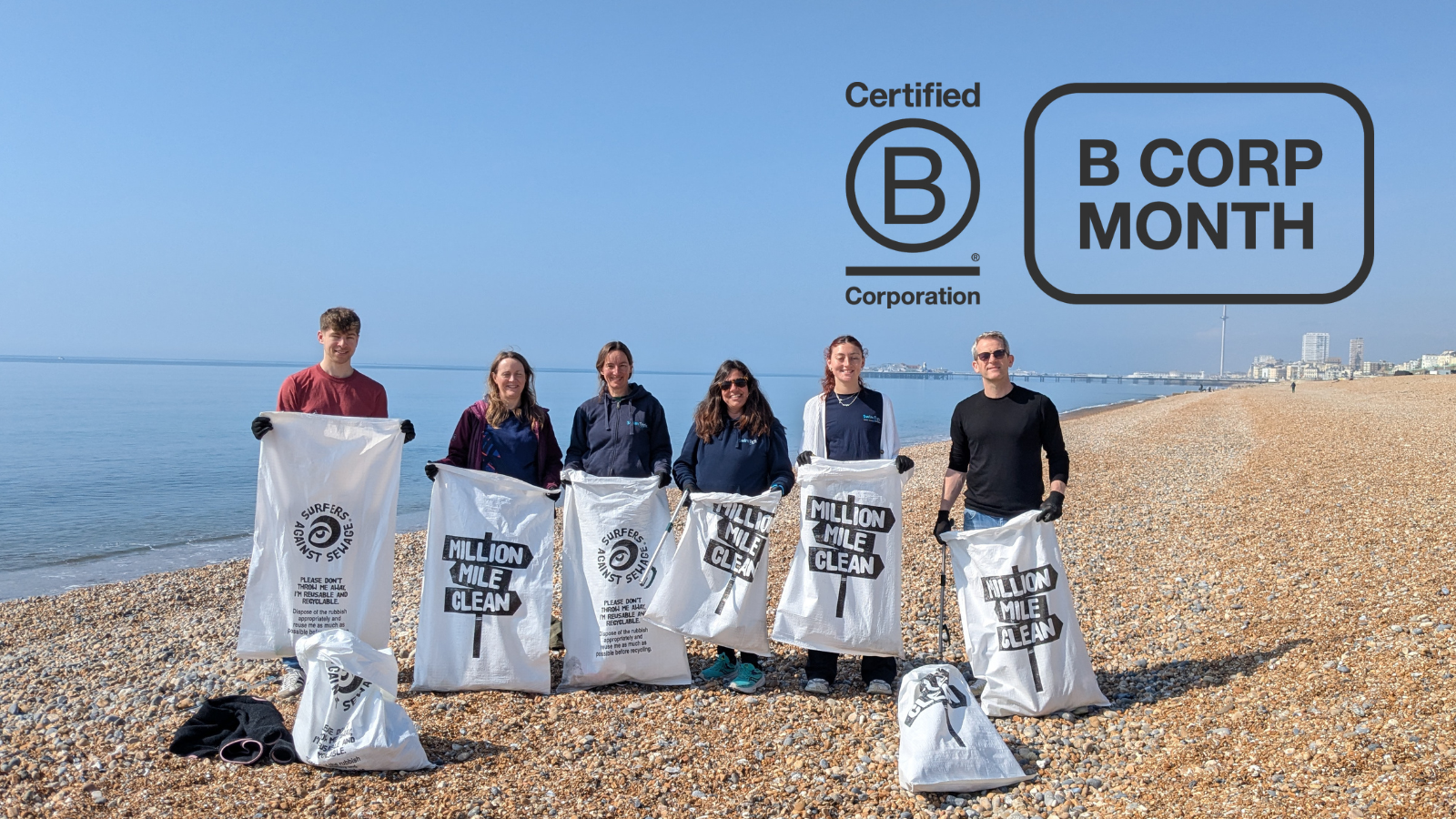
In the last week of March 2025, SwimTrek HQ took part in a beach clean for B Corp Month as part of the Surfers Against Sewage Million Mile Beach Clean Campaign. We collected almost 10kg of plastics and rubbish across a mile stretch of Brighton Beach. Just a little bit to help towards a collective effort to reduce the plastics going into our precious ocean.
‘Just a little bit to help towards a collective effort to reduce the plastics going into our precious ocean…’
If you are looking to join a local beach clean, we encourage you to adhere to the following precautions:
- Wear gloves and follow safety instructions on how to handle sharp objects and avoid hazardous materials.
- Attend a safety briefing for all participants before starting.
- During the clean, stay within designated beach areas, focusing on plastics, fishing nets, bottles, and harmful waste.
- Ensure waste is sorted into recyclable, non-recyclable, and hazardous categories.
- Weigh all collected waste, submit the total weight and share images of you hard work within your community.
- Dispose of waste according to local recycling and disposal guidelines.
- Keep a first aid kit available and be prepared for emergencies.
- Remind fellow volunteers to respect wildlife and avoid disturbing habitats.
Your leadership in preserving the environment helps make a real difference, encouraging others to join the effort.
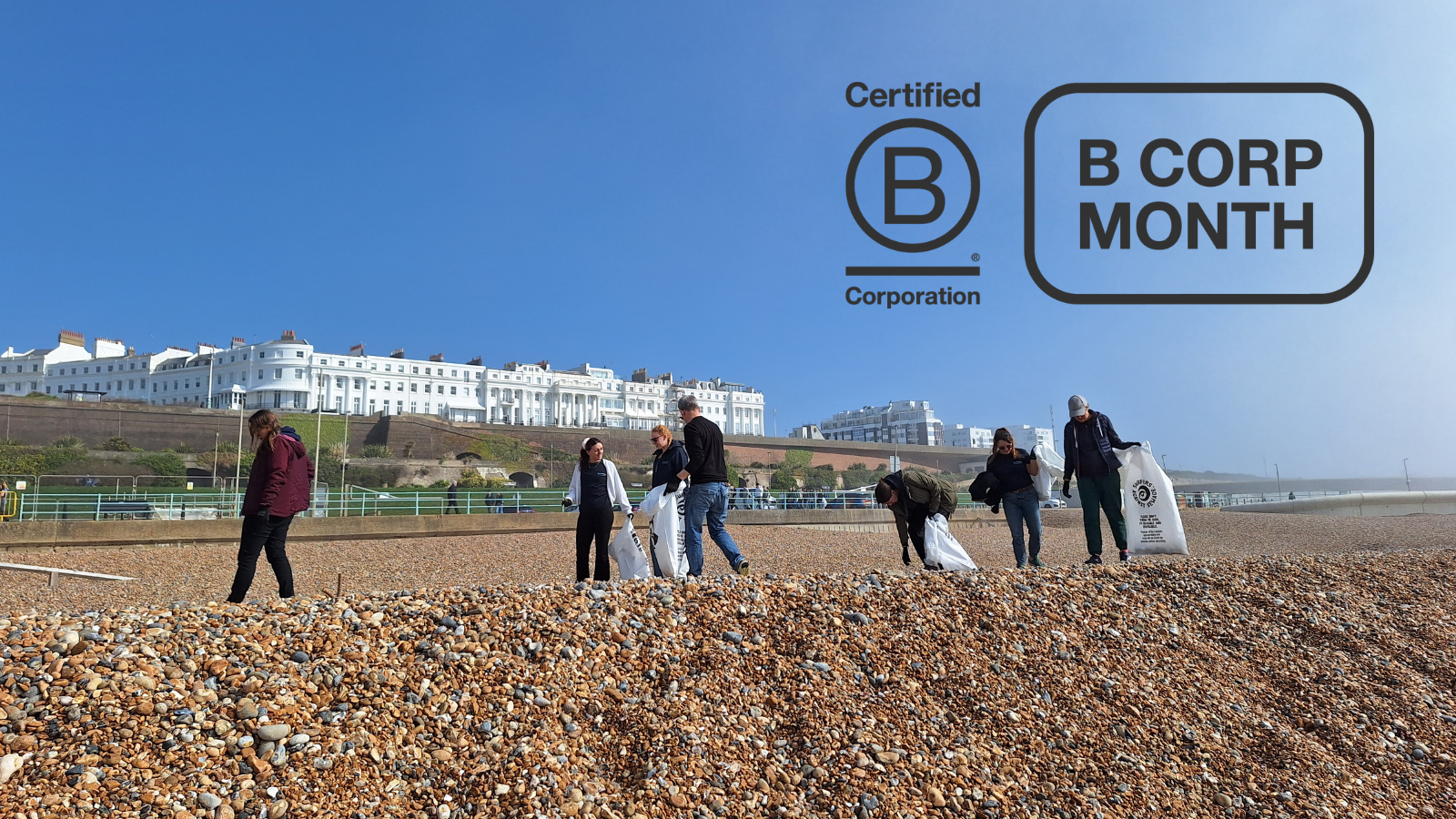
Clean Ups On Location
On location, during our trips, we are encouraging guides and swimmers to actively contribute to protecting our oceans by removing plastic pollution. You may see more of our groups engaged in clean-ups, picking up litter as they go and promoting a Leave No Trace philosophy. The importance of raising awareness and staying active in protecting the places we travel to cannot be overstated.
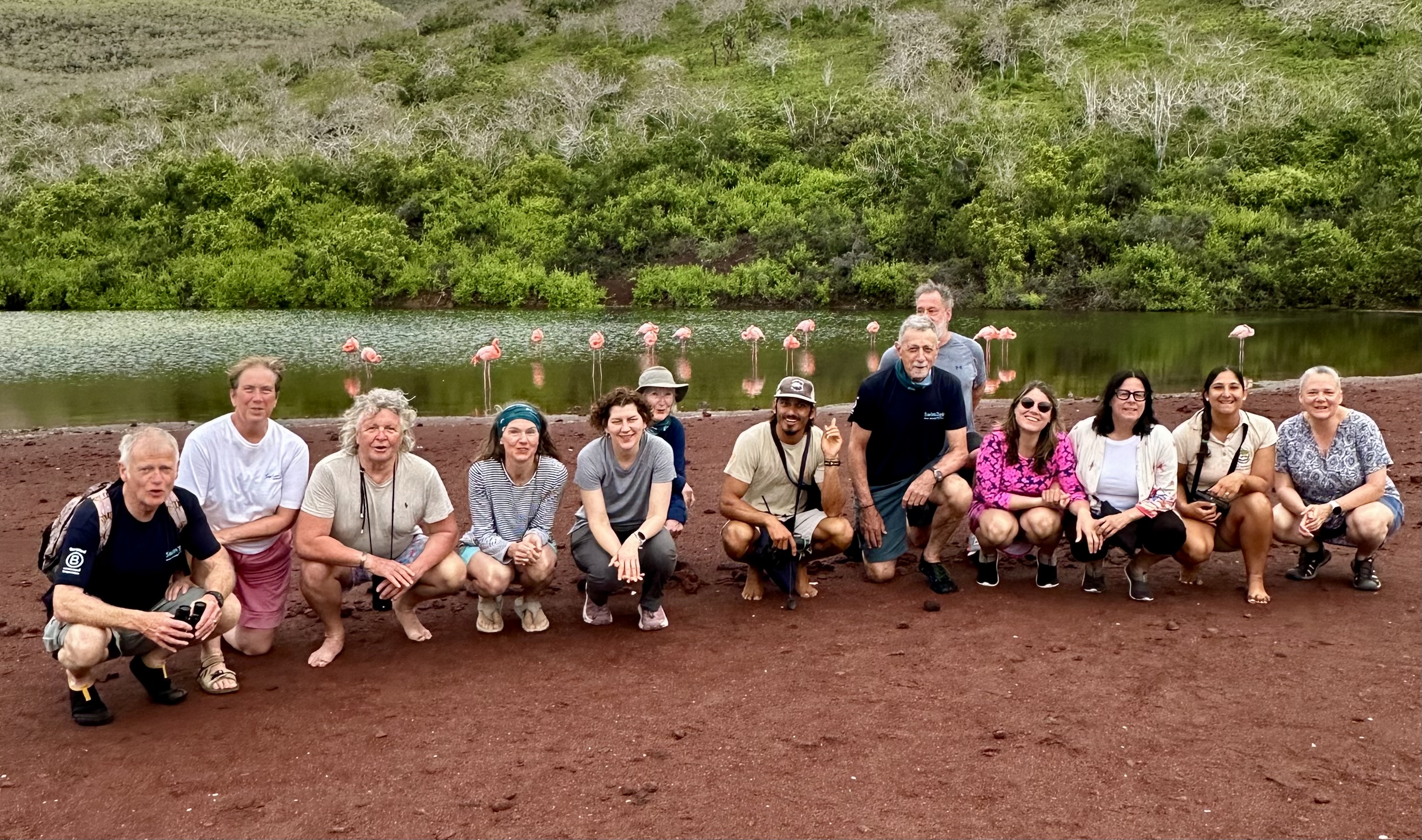
Ben In The Galapagos
One of guides, Benjamin McIver - surely a familiar face to any of you who've visited our Brighton HQ - was involved in a recent sea clean-up during our Galapagos Explorer trip. They didn't conduct a beach clean, but what the group did was collect ocean litter whilst they were in the water. We've included images of some collected debris, which would endanger wildlife and potentially disrupt the food chain to create dead zones where marine life can no longer thrive. Imagine if this ever happened to the precious Galapagos Islands.
As they explored more of the islands and coastal waters, the group was always on the lookout for daily findings of litter to remove. The majority of this was found on the reefs and in the bays where they were anchored in. The beaches as a whole were either pristine or plastic had arrived in the form of microplastics that were too small to pick up. They weren’t able to weigh the litter, but they did document their clean-ups as you can see.
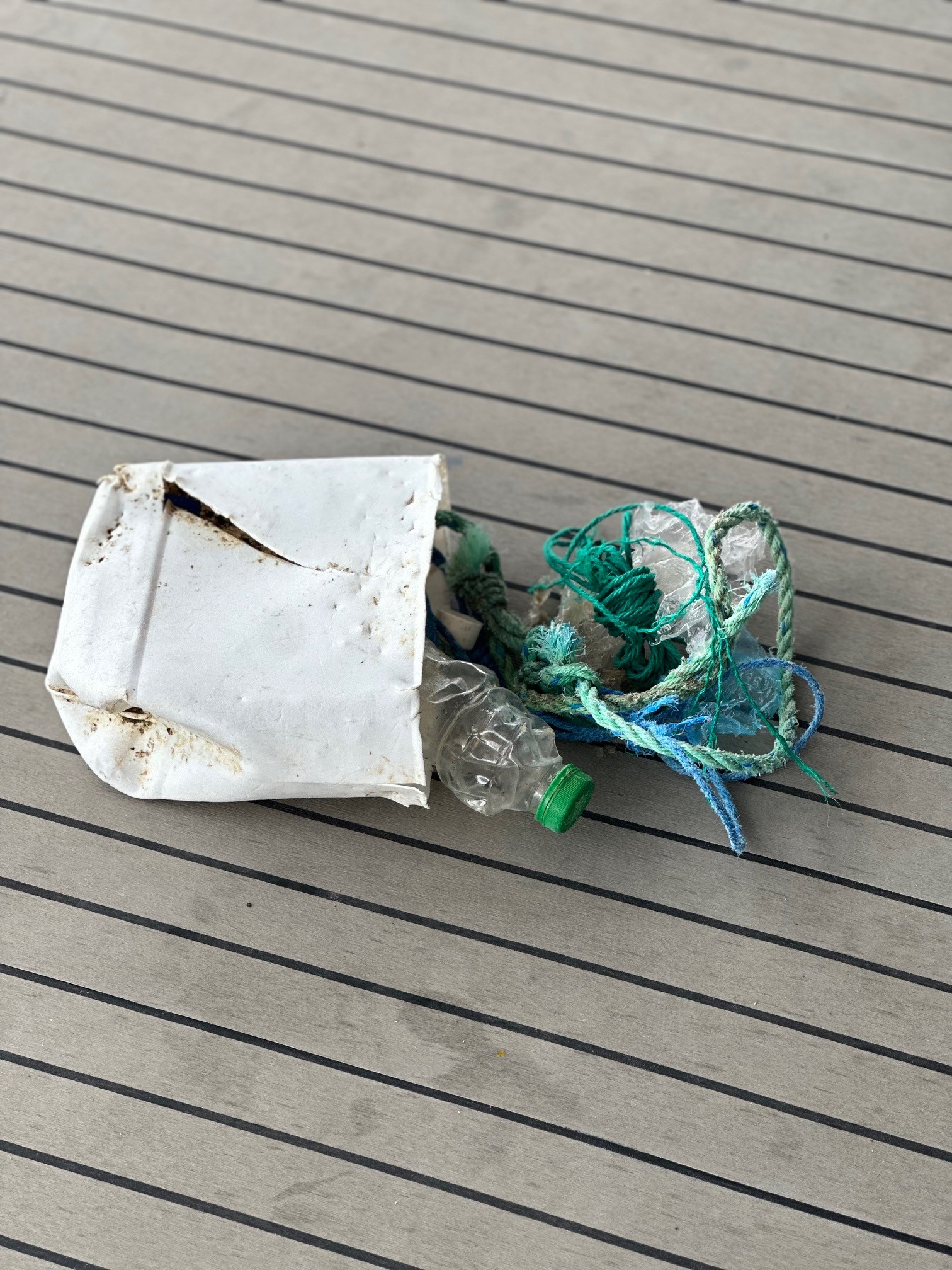 Ocean litter found on our Galapagos trip.
Ocean litter found on our Galapagos trip.
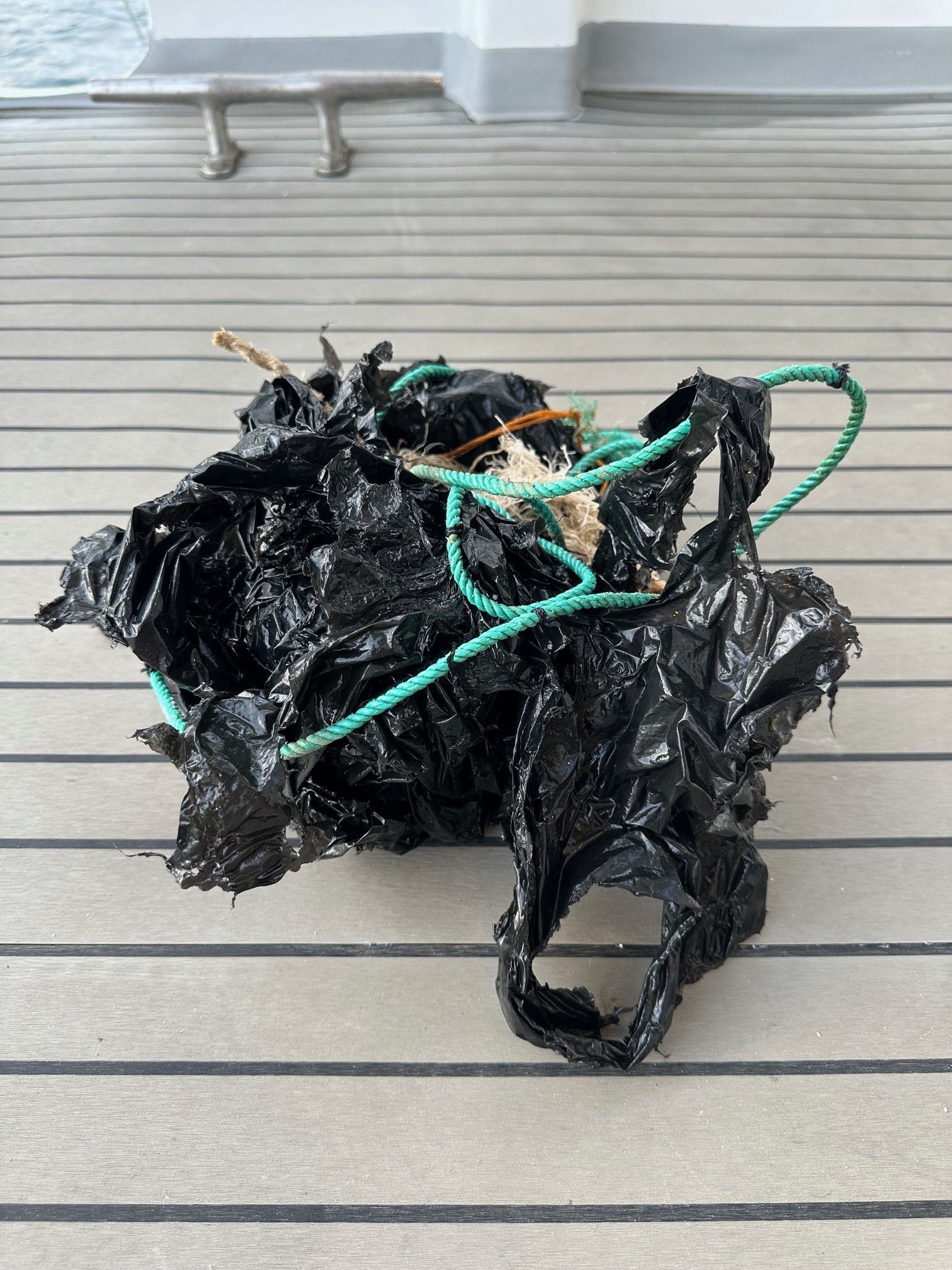 More litter pulled from the water by SwimTrekkers.
More litter pulled from the water by SwimTrekkers.


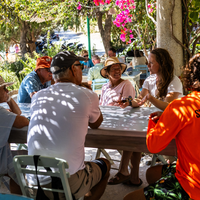
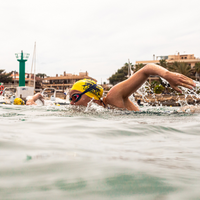
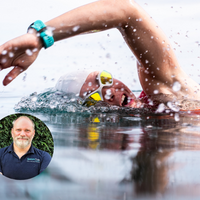
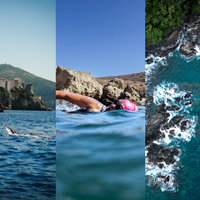
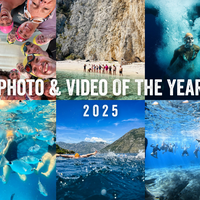
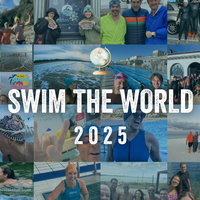
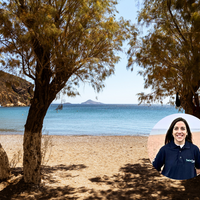
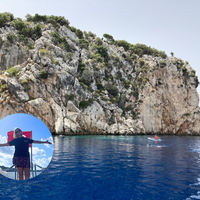
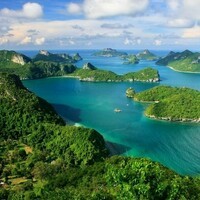
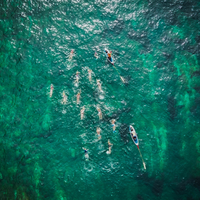
Ann Cousins @swimtrekker_1dfc3koekkvz
Any chance that you can look at more trips in locations that are easier to access by train from the UK as part of your sustainability commitments?
posted over 2 years ago